Reviews of "Minari," "Two of Us" and "I Care a Lot," as well as a Top 10 Movie list blog preview, are all in the latest Movies with Meaning post on the web site of The Good Media Network, available by clicking here.
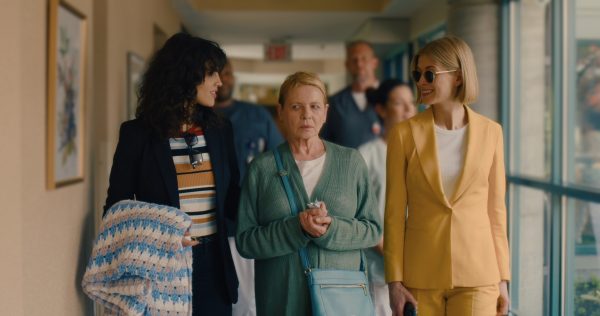

Reviews of "Minari," "Two of Us" and "I Care a Lot," as well as a Top 10 Movie list blog preview, are all in the latest Movies with Meaning post on the web site of The Good Media Network, available by clicking here.


“I Care a Lot”(2020 production, 2021 release). Cast: Rosamund Pike, Peter Dinklage, Dianne Wiest, Eliza González, Chris Messina, Isiah Whitlock Jr., Macon Blair, Alicia Witt, Damian Young, Nicholas Logan. Director: J Blakeson. Screenplay: J Blakeson. Web site. Trailer.
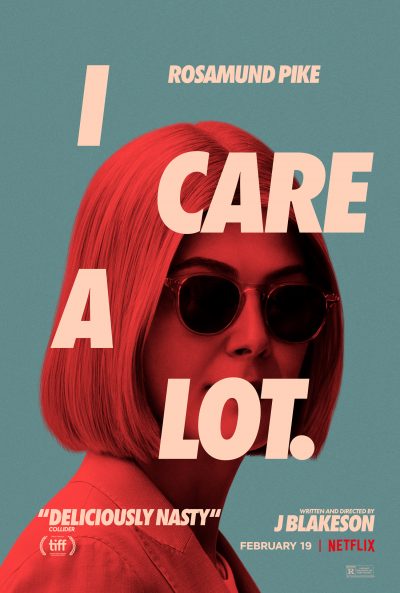
Inflicting cruel intentions on others is a truly despicable act. But, as appalling as that is, it’s even worse when they’re camouflaged in what appears to be heartfelt, altruistic sincerity. The malice permeating such circumstances is staggering, leading to an array of indignities. Of course, such scenarios can also sow the seeds of retribution against the perpetrators, as an unscrupulous business owner discovers for herself in the bitingly cynical new dark comedy, “I Care a Lot.”
Marla Grayson (Rosamund Pike) has got quite a sweet deal going for herself. As the owner of a legal guardianship agency, she assumes legal responsibility for the care of seniors who are unable to attend to their own needs, many of whom are afflicted with various forms of dementia and memory disorders. In many of those cases, the patients either have no families to provide care or their relatives are judged unsuitable in one way or another (negligent, abusive, disinterested, etc.). And Marla’s apparent sense of compassion is so seemingly heartfelt that she never has any trouble convincing courts to rule in her favor when it comes to awarding guardianship in these situations, particularly before an especially sympathetic justice, Judge Lomax (Isiah Whitlock Jr.). It all appears perfectly legitimate and above board. There’s just one catch: It’s all a well-orchestrated scam.
With the help of her partner in life (and partner in crime), Fran (Eliza Gonzalez), Marla has got her scheme down to a science. She identifies prospective “clients” with the aid of Dr. Karen Amos (Alicia Witt), a shady medical practitioner who supplies Marla with leads on patients who are easily railroaded into being declared unfit to maintain their independence, often in “emergency” court proceedings at which the individuals in question aren’t even present. Some of these patients truly suffer from various forms of impairment, but others are only marginally incapacitated at best. Marla’s new clients are then involuntarily transferred from their homes to a senior living residence managed by Sam Rice (Damian Young), who willingly complies with all of Marla’s requirements regarding medication, housing, access to outsiders and all other forms of care, all without any say by the patients or their kindreds. Marla’s plan generally isolates her clients so thoroughly that almost no one has any contact with them, and they, in turn, are unable to reach out to the outside world. And, as outrageous as that might seem, it’s all perfectly legal.
With her clients isolated, that leaves Marla free to do as she will when it comes to the management of their lives, most notably their assets – bank accounts, investments, property and so forth. Given her legal control over these items, she’s free to do whatever she wants with them. This usually involves their liquidation, with most of the proceeds going into her own pocket. She justifies this practice by claiming that the funds generated from such sell-offs and close-outs are necessary to cover her organization’s operating expenses. She gets away with it with relative ease, too. And, if a problem arises, she merely takes it before Judge Lomax, who nearly always rubber-stamps her requests. This becomes apparent, for example, in a case involving Mr. Feldstrom (Macon Blair), who is legally prevented from seeing his mother, based on trumped-up claims that his visits seriously upset her, a problem that Marla convincingly portrays as not being in her client’s best interests. Her slimy but well-rehearsed sincerity routine is so thoroughly persuasive that Judge Lomax can’t help but concur, an outcome that plays out over and over again in countless proceedings.

When one of Marla’s clients passes away unexpectedly – with the fleecing process still incomplete, an “investment” that doesn’t reach its full payoff potential – Sam advises her that there’s an opening in his facility for a new patient. This prompts Marla to visit Dr. Amos in search of a new client recommendation. Having helped out Marla many times in the past, Dr. Amos says she may have a prospect but adds that she wants a piece of the action this time, primarily because the individual in question is a “cherry” ripe for the picking. The mark is Jennifer Peterson (Dianne Wiest), a recently retired financial professional who has amassed more than a small fortune over the years, has begun showing modest signs of memory loss and has absolutely no known family members. She’s the kind of prospect for whom a plea for an emergency proceeding can easily be filed and, thanks to Judge Lomax’s dimwitted naiveté, is almost guaranteed to result in a ruling in Marla’s favor.
Before anyone knows it, Marla’s plan to rope Jennifer is a done deal. Needless to say, Jennifer is stunned and bewildered by what’s happening around her. She quickly finds herself whisked away from her beautifully appointed home and resettled in a comfortable but small two-room unit at Sam’s facility. Her cell phone is confiscated, and she’s confined in what amounts to a heavily secured institution that allows her no access to the outside world. She’s anxious to protest her conditions, but, given that Marla has given orders that she be heavily sedated, it’s unclear how seriously any such complaint might be taken.
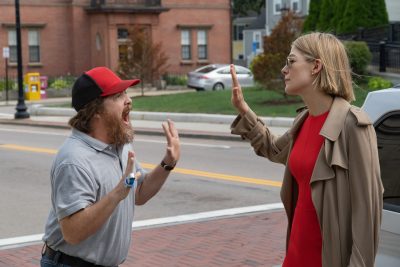
From Marla’s perspective, everything seems to be going according to plan. However, before long, an unexpected hiccup emerges. While Fran is busy preparing Jennifer’s home for sale, she receives a visit from a cab driver (Nicholas Logan) seeking to pick up Jennifer for what appears to be a regular, previously scheduled ride. When Fran explains to the driver that Jennifer no longer lives there, he leaves somewhat surprised – and scared. Fran’s not sure what to make of it, but, when she explains the situation to Marla, she seems unfazed. It’s a position she seriously might want to reconsider.
In short order, Marla receives a visit at her office from lawyer Dean Ericson (Chris Messina), an oily shark of an attorney who claims to represent individuals interested in the welfare of Ms. Peterson. His lack of specificity leaves Marla unimpressed, prompting him to propose various forms of settlement, all of which she rejects, suspecting she can get more out of him than what he is offering. Ericson’s tone soon changes, moving from talks of compromise to less-than-veiled threats, contending that he’s associated with powerful individuals who care greatly about Jennifer’s well-being and who could inflict tremendous harm if their wishes are not complied with. No matter what he says, however, she repeatedly rebuffs his claims, essentially telling him to take a hike.
Little does Marla know that she’s embarked on quite a perilous course. This is confirmed when she pays a visit to Jennifer, who, with a sinister laugh and smug smile, tells Marla that she’s “in trouble now.” As it turns out, Marla is unaware that her client truly does have powerful contacts in her corner, most of them members of the Russian mob, most notably Roman Lunyov (Peter Dinklage), a truly bad dude. He’s so ruthless, in fact, that he gravely intimidates his attorney, Mr. Ericson, and his chief muscle, Alexi Ignatyev, the purported cab driver who reluctantly and sheepishly had to report Jennifer’s mysterious absence to his now-furious boss. In light of Jennifer’s disappearance, Roman begins turning up the heat to find out what happened to her, an effort that places Marla and her cohorts in extreme danger. It sets up a scenario where a slick con artist is now faced with matching wits with a truly evil crime figure. And it’s a conflict that is bound to get exceedingly nasty, full of unexpected twists and turns, before anything is resolved – if that’s even possible at this point.

When we intentionally seek to deceive others, we’re playing with fire. Such acts, backed by nefarious motives, are time bombs waiting to go off – maybe not in the short term and perhaps not all at once, but certainly at some point. Some might call this karma or just deserts, and those designations are certainly fine. However, more precisely, they’re purposely created acts based on one’s beliefs, the stuff of the conscious creation process, the philosophy that maintains we draw upon these intangible resources in manifesting the reality we experience. And, when we load the dice of our beliefs with a toxic mix of intentions, the concoction is quite volatile, just waiting to explode with vile repercussions when the time is right, as Marla and company are about to find out.
Hatching a scheme like the one Marla has cooked up involves purposely formulating beliefs aimed at inflicting harm on others. She willingly seeks to bring about circumstances that fulfill this objective. What’s perhaps most egregious about this is that she knows what she’s doing and then intentionally does it, compounding those acts by lying to others with a phony smile that’s often erroneously interpreted as wholly sincere. And, if anyone dares question her earnestness, she’s prepared for that, too, by manifesting contingencies to cover her behind and make the pleadings of any claimants look foolish, as seen in her dealings with Mr. Feldstrom.
In a perverted sort of way, one could say that Marla’s plan is one of sheer genius in the way she has skillfully manipulated matters to her advantage. It shows tremendous dexterity in the way she has learned how to overcome the limitations that might restrain the more ethically minded among us in bringing about the results she seeks. In fact, on a purely theoretical level, some conscious creation practitioners might even be in awe of how nimbly she pulls it all together.

But, such cleverness and proficiency aside, this scenario is fraught with all manner of moral issues, which, like everything else one creates, stem from the beliefs we put into their manifestation. And there are some real doozies at work here, the consequences of which Marla can’t be oblivious to. That’s what accounts for her efforts in creating the contingencies she has materialized, stopgap measures aimed at protecting her interests should the need arise.
However, even with her keen sense of being able to envision all of the situations for which such contingencies might be required, can Marla realistically prepare for them all? That’s especially true when it comes to those circumstances where the underlying moral issues of her scam come racing to the surface, sleeping giants that unexpectedly jump up and surprise her like a jack-in-the-box clown. It’s under conditions like that when the scam is susceptible to come crashing down, as Marla discovers in her dealings with Jennifer’s powerful associates.
No matter how creative we might be in coming up with plans to fulfill our goals, we must be cognizant of all of the beliefs that go into their making. If we only pay attention to those that we assume will work to our benefit without giving due consideration to those that could work against us despite their undeniable presence, we place ourselves in serious jeopardy, for those unappealing intentions will make their influence known at some point. And that’s simply due to their inclusion in the belief mix that brought about such scenarios in the first place, no matter how much we might try to disavow them or hope they fail to materialize.
This, of course, raises the question, “Can someone like Marla really get away with something like this?” Well, much rests with how thoroughly she manifests her protective contingencies. But success or failure also depends on how skillful her opponents are in developing effective counter-measures. And, based on what Mr. Lunyov appears capable of, Marla is about to have her hands full.

Perhaps the most important lesson to consider in all this is the consequences that accompany predatory behavior, which has been allowed to run rampant here. In a voice-over at the film’s opening, Marla waxes philosophically about this notion, and she unabashedly admits to being like a lioness that is determined to relentlessly hunt down her prey. That kind of determination and self-confidence have obviously played huge roles in her heretofore success, illustrative of her core capabilities as an expert conscious creator. However, given the powerful ethical issues that permeate such practices here, can she sustain that success indefinitely?
In a sense, Marla’s story becomes a metaphor for the practice of predatory capitalism. It’s a scathing indictment of a system that puts profits and self-interest before people, one in which the game is rigged from the outset and most of the players have absolutely no say in their participation. What’s more, this metaphor operates in this film on several levels. First there’s the individual scale, as evidenced by the indignities that Marla thrusts upon Jennifer. But then there’s also the global scale, as symbolized by the parties involved in this dispute – an American businesswoman doing battle with a Russian mobster. The symbolism behind this conflict speaks volumes about the sheer scope of this practice as it’s applied on a worldwide scale, a truly scary and infuriating prospect. That’s especially apparent when the resolution of their combat is revealed, providing a chilling reflection of what’s really going on in the wider world.

From this standpoint, one might arguably view the situation as hopeless. In fact, that’s one of the reasons why this film has come under ridicule by some viewers and critics. They’re unable to sympathize with either of the combatants, and they lament that there’s no way for those who have been dealt out of the game to get back in. But, in creating our existence, there are always infinite possibilities to choose from as long as we’re able and willing to envision their realization. That, in itself, should give us hope, to provide us with the inspiration to devise ways of overcoming such seemingly intractable conditions. And, if we can do that, then maybe – just maybe – the predatory capitalists won’t be able to get away with it after all.
Seeing the ugly truth exposed in all its vile splendor may be unpleasant, hurtful and shocking, but sometimes it’s a necessary wake-up call for the betterment of our collective well-being, as this cynical, darkly satirical comedy and social commentary illustrates, especially with regard to the nature of predatory capitalism. While the film admittedly goes off the rails at times in its second half, its wickedly biting humor makes clear the ruthlessness inherent in the practices of this economic system, both on a personal and a global geopolitical scale. What makes the film, though, are its superb performances, especially those of Wiest, Dinklage, and, especially, Golden Globe Award winner Pike, who delivers a riveting portrayal throughout. Some may find the content and message of this offering rather troubling, but that’s simply the movie doing its job: It stresses the need for us to shed our Pollyanna attitudes, no matter how disillusioning that might be, and open our eyes. Indeed, it reminds us of the old adage that it’s easier to fool people than to convince them that they’ve been fooled. The film is available for online streaming.
We’re no doubt aware that it’s possible to fool some of the people all of the time and all of the people some of the time but not all of the people all of the time. Nevertheless, the perpetrators in this story don’t seem to buy into that notion, a view they maintain at their peril, especially when confronted by equally adept crime figures (not to mention a mountain of karma). And, when up against such circumstances, it doesn’t matter how much one might claim to care.
Copyright © 2021, by Brent Marchant. All rights reserved.
With theaters back open and the awards season in full swing, film fans have more new viewing options than they have had in a long time, either from home or in moviehouses. Find out about some excellent new selections and leading awards contenders on Thursday, March 25, on the latest edition of The Good Media Network’s Frankiesense & More video podcast with yours truly and host Frankie Picasso. Tune in at 1 pm ET on Facebook Live by clicking here for a lively discussion of new releases worth seeing (and some worth avoiding). And, if you don’t see it live, catch it later on demand!
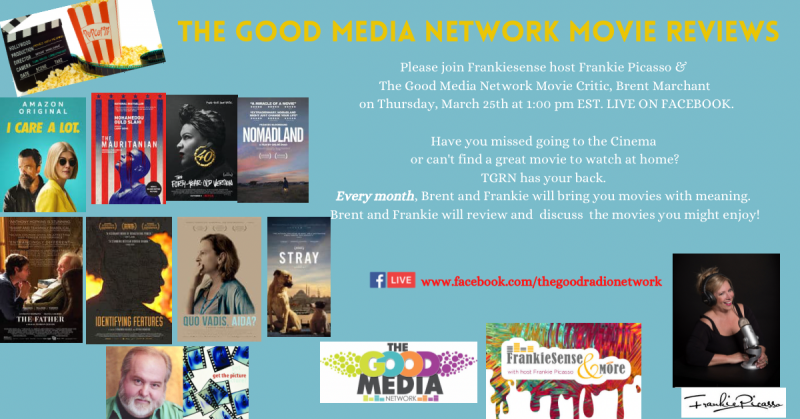
“Two of Us” (“Deux”) (2019 production, 2021 release). Cast: Barbara Sukowa, Martine Chevallier, Léa Drucker, Jérôme Varanfrain, Muriel Bénazéraf, Augustine Reyes, Hervé Sogne. Director: Filippo Meneghetti. Screenplay: Malysone Bovorasmy, Filippo Meneghetti and Florence Vignon. Web site. Trailer.
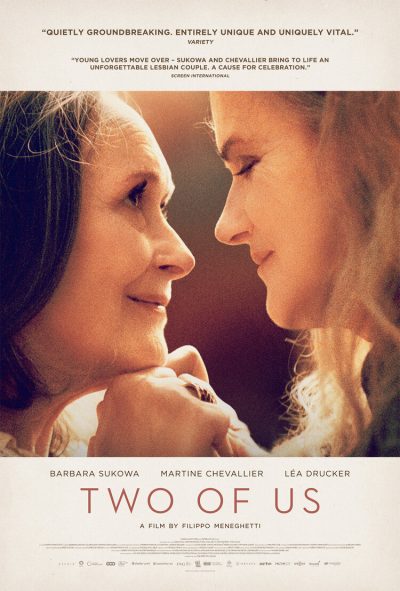
We’ve all been led to believe that “Love conquers all.” But is that really the case? Aren’t there situations that arise where, no matter how much love is present, it can’t solve every problem that arises? And, if so, then what? How can circumstances be resolved satisfactorily? Such is the dilemma raised in the heartwarming and heartbreaking new French love story, “Two of Us” (“Deux”).
Madeleine Girard (Martine Chevallier) and Nina Dorn (Barbara Sukowa) have been in love for years. They met while on vacation in Rome, and now, as they’re ready for retirement, Madeleine plans to sell her Paris apartment so that they can return to the Eternal City to live out their golden years together. There’s just one catch: Before Madeleine took up with Nina, she was married and had two children, and, after her husband died, she never told them about her same-sex relationship, even now as Anne (Léa Drucker) and Frédéric (Jérôme Varanfrain) have reached adulthood. They’re aware of their mother’s “friendship” with Nina, believing her to be Madeleine’s neighbor from across the hall, but they have no clue about the true nature of the connection between the two women. And that apartment across the hall is merely a safety valve, a sparsely furnished place for Nina to retreat to when the need arises, such as when Madeleine’s children come to visit.
Madeleine’s reluctance to come out to Anne and Frédéric has long been a source of contention between the partners. Nina has been open about her sexuality for years (except, of course, when around Madeleine’s family), and this difference in attitude has been an ongoing source of frustration for her, making Nina feel as though she has to walk on eggshells and artificially hide her true self when called upon. Nina’s encouraged, though, when Madeleine reveals that, due to the impending sale of her apartment, she plans to tell her children the truth about herself.
So why hasn’t Madeleine said anything to Anne and Frédéric previously? As someone who grew up at a time when opening up about one’s homosexuality was a risky proposition, she’s never been able to shed her hesitancy about violating this once-powerful taboo, despite society’s greater acceptance of the idea in recent years. In many ways, this truly is a case of not being able to teach an old dog new tricks. But there’s more to it than that; Anne and Frédéric have come to believe that their late father truly was their mother’s one and only great love, and Madeleine has not been able to bring herself to say anything that would shatter that illusion.
However, with such a big change now pending in Madeleine’s life, she feels she has to say something, and she decides to do so at her birthday dinner with Anne and Frédéric, as well as her grandson, Théo (Augustine Reyes), Anne’s son. But, when the time comes to open up, Madeleine backs down, and, when she tells Nina about this, she’s furious. They have a bitter argument, one that leaves their future in doubt and Madeleine shaking.
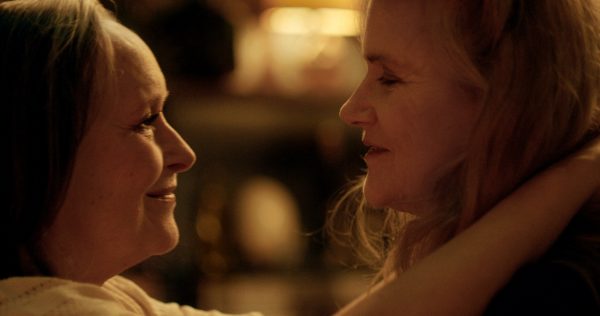
That future is quickly left in even greater doubt when Madeleine suffers a debilitating stroke, leaving her largely immobilized and completely unable to speak. Nina is ridden with guilt, believing that her angry outburst may have caused or contributed to the incident. She naturally wants to take care of Madeleine, partly to atone for behavior, but, more than anything else, because her partner is the one she loves. However, given that Madeline never told Anne and Frédéric about Nina, she’s quickly pushed to the sidelines. Madeleine’s children know nothing about the relationship and believe that Nina is nothing more than their mother’s friend and neighbor. So, when it comes to making decisions about Madeleine’s care, Nina suddenly finds herself out of the loop; those determinations are now in Anne and Frédéric’s hands, and about all Nina can do is sit back and watch.
Needless to say, this situation is unacceptable to Nina. She feels a need to be more involved, and, once Madeleine comes home, she looks for ways to do so. However, once again, since the truth of the relationship has been kept from Anne and Frédéric, she’s unable to have much say, especially once the children hire a home caretaker, Muriel (Muriel Bénazéraf), to attend to their mother. Nina slowly ingratiates herself with Anne and Muriel, looking for ways to provide friendly assistance, help that they welcome, at least in limited ways, and only under certain circumstances.
It’s during these brief times together that Nina comes to realize just how much she loves her partner. She misses the everyday ongoing contact with Madeleine that she had grown so accustomed to, and she wants it back, despite her depleted condition. However, how can Nina get past the gatekeepers who are restricting her access and who know nothing about the true nature of her relationship with their mother and patient? That’s the situation that’s about to unfold, marked by the emergence of an increasingly contentious scenario with much at stake. Is there enough love involved to overcome these trying circumstances? Can everyone’s needs be addressed? And will the truth at last come out?
In shaping the life we want for ourselves, honesty and authenticity generally win the day. That’s because those qualities reflect our true feelings, our beliefs about how we see ourselves. And those beliefs, in turn, are responsible for manifesting the existence we experience, a product of the conscious creation process, the philosophy based on that principle.
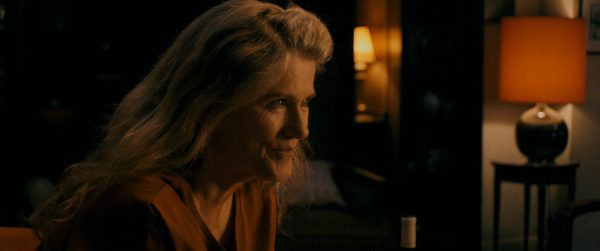
Such notions are particularly important in matters of love, as they fuel the qualities and integrity of our relationships. In fact, in many respects, they’re what makes our romances succeed and flourish. This principle affects all aspects of our relationships, such as our connections to those around us, like family and friends. When we’re honest about our loves with those who care about us, it further enriches the quality of our romantic bonds, largely because everything is above board, with nothing hidden.
Unfortunately, that’s where Madeleine and Nina have gotten themselves into trouble. Madeleine’s inability to come forward about her true self has strained her relationship with Nina. In some ways, that hiding has also harmed her connection with Anne, Frédéric and even Théo. Since she’s not able to bring herself to be forthcoming with her family, her lack of truthfulness hurts her bond with them, almost as much as it does her relationship with Nina.
Madeleine’s reluctance in coming out is obviously rooted in fear, which is a belief in itself, one that often has powerful manifestation capabilities inherent in it. She grew up with the frightfulness that was often associated with stepping forward about one’s sexuality, and it’s likely that she hasn’t been able to rid herself of that apprehension, despite the emergence of greater tolerance in recent years. But, just as important, there’s the fear of disappointing and disillusioning her children, not only about her orientation, but also about the nature of her relationship with their father. She can’t bring herself to shatter that image out of fear that it will permanently damage her relationship with them. Of course, the more she holds on to that belief, the more ingrained those circumstances become, making it ever more difficult for her to change.
Getting past those fears and the limitations that they’ve imposed upon her is crucial if she ever hopes to find true contentedness and inner peace. Should she fail in this, she runs the risk of losing the love she’s forged with Nina. It also threatens to keep her relationship with Anne, Frédéric and Théo on tentative terms, preventing those bonds from blossoming and reaching their true, fullest potential. Admittedly, taking such a big step requires a leap of faith, a willingness to embrace beliefs that will take Madeleine into uncharted territory, but it’s territory that holds the promise of even greater fulfillment than she’s ever experienced, both with Nina and her own family. It’s an act of heroism that can yield tremendous rewards, benefits that can potentially go far beyond anything imagined.
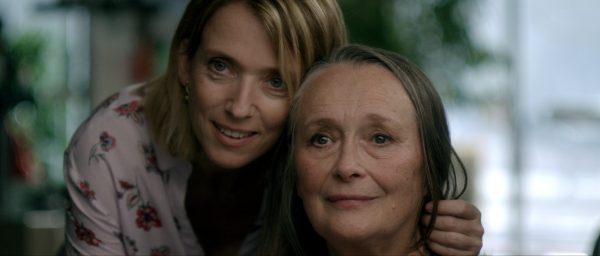
If Madeleine is worried about what’s called for, she should consider taking a cue from our divine collaborator in the conscious creation process, the loving force of the Universe (or All That Is, God, Goddess, Source or whatever other name one chooses). That love is a source of unconditional support for our endeavors, helping us to make possible what we seek. However, our collaborator requires clarity from us in the belief department; It must have an unfettered handle on what we want, because, if the beliefs are tainted by contradictions or muddled by a lack of precision, It won’t know what to provide, keeping us from attaining what we hope to achieve.
For example, if we try to convince our collaborator that we want an open, honest relationship but simultaneously intentionally seek to keep aspects of it concealed, that’s a contradictory belief mix primed for trouble. One can see that, for instance, in the argument between Madeleine and Nina. The long-simmering frustration that has been brewing for some time finally surfaces, despite the depths of the love between them, and it threatens to destroy everything they’ve built together. Is an outcome like that really worth it? That’s something to consider before formulating the beliefs we need to make our hoped-for results materialize. And, in a matter as important as love, that can’t be emphasized enough.
How and who we love has undergone tremendously liberating changes in recent years, but, for some seniors, who remember a time when such tolerance was absent, the past painfully lingers on into the present. Director Filippo Meneghetti’s debut narrative feature brings this to light in his intensely gripping and moving work, one that grabs viewers by the collar and makes the frustration experienced by its protagonists truly palpable – and quietly infuriating. The superb performances by Sukowa and Chevallier are riveting and heartfelt, achieving powerful impact with gestures as simple as facial expressions and piercing views into their eyes. There are a few incidents in the narrative that seem a bit far-fetched, especially in the film’s second half, but they’re compensated for by everything else this release has to offer. The pain and warmth of this one must be experienced by anyone with a conscience – or a pulse – to see that, no matter how far we have come, there’s always more ground still to be made up. This Golden Globe and Critics Choice Award nominee for best foreign language film is available for online streaming.
Despite the prevalence of love around us, it’s sometimes mystifying why it seems so hard to find, as anyone who has perused dating sites can probably attest. And, because of that, we should make it a point to cherish it with all our might when we find it, to do what we can to cultivate and nourish it so that it can bloom without reservation. That, of course, starts with us and how we view it, beginning with the beliefs that help to bring it into being in the first place. Once we realize that, we may be a lot less likely to get in our own way and keep such a magnificent gift from coming our way.
Copyright © 2021, by Brent Marchant. All rights reserved.
Tune in for the latest Cinema Scribe segment on Bring Me 2 Life Radio, Tuesday, March 23, at 2 pm ET, available by clicking here. And, if you don't hear the show live, catch it later on demand, now available on Sound Cloud and Amazon!
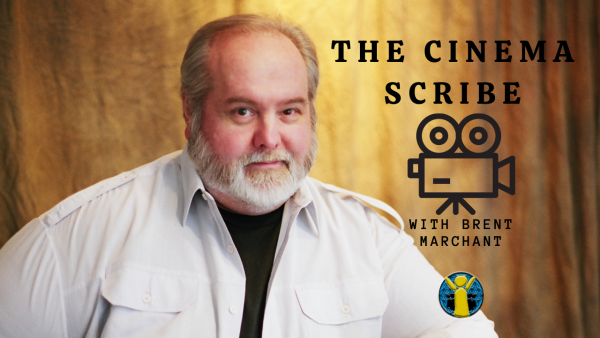
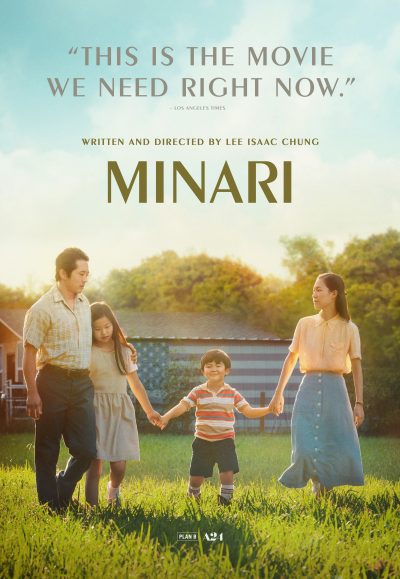
“Nasrin”(2020). Cast: Nasrin Sotoudeh, Ann Curry, Reza Khandan, Nima Khandan, Mehraveh Khandan, Narges Hosseini, Jafar Panahi, Shirin Ebadi, Taghi Rahmani, Marietje Schaake, Monsoureh Shojaee, Olivia Colman (narrator). Director: Jeff Kaufman. Writer: Jeff Kaufman. Web site. Trailer.
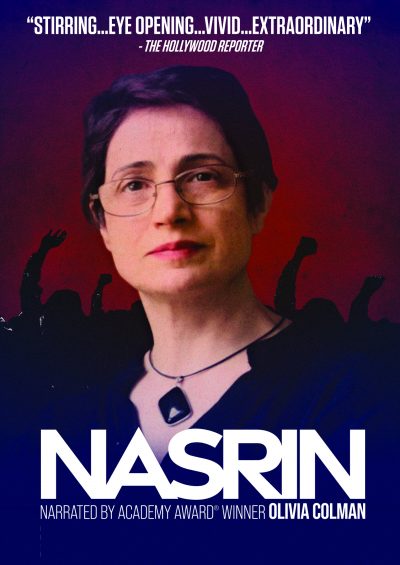
We can all use a little help from time to time. There are even times when we can use a lot of it, and, in those instances where we’re up against seemingly impossible odds, such as being under the thumb of despotic authority figures, it’s positively essential. Thankfully, there are champions out there who are willing to rise such occasions, even when it comes to putting their own well-being on the line, as illustrated in the new biographical documentary, “Nasrin.”
Nasrin Sotoudeh may not be a familiar name to many of us. But, to countless Iranians who have come under attack by the Islamic state’s authoritarian fundamentalist rule, she has been a godsend. As one of the nation’s (indeed, the world’s) most passionate and prominent human rights advocates, Nasrin is an attorney who speaks her mind and fights aggressively for her clients, often confronting a brutal, autocratic government and a capricious, unreliable court system. In her many years of practice, she has fought hard in the defense of women, children, ethnic minorities (such as the Iranian Kurd community), members of the LGBTQ+ community, religious minorities (such as practitioners of the Bahá’í faith), persecuted artists and outspoken political reformers against overblown charges brought by a regime seeking to suppress opposition at any cost, including instances involving blatant illegality, unethical conduct and outright lying. And, for her efforts, she has gained international notoriety but at a cost to herself, including foreign travel bans, restrictions on practicing law, imprisonment and threats of physical torture.
Nasrin has a history of defending those who have had no one to speak for them under such oppressive circumstances. This has included representation of high-profile figures, including activists, journalists and opposition politicians. At the same time, her work has also addressed caring for the needs of the innocent, such as protecting children in custody cases involving parents with known histories of abuse seeking to retain access to their youngsters brought before judges sympathetic to their causes.
Nasrin has been especially active when it comes to women’s rights. Given that more women than men graduate from college in Iran, she believes that they can play an important role in helping to shape the nation’s future but that they must have the freedom to do so to fulfill that role. That includes measures that many in the West may see as simple but that are nevertheless crucially important to the women of Iran.
For example, she has quite aggressively challenged government dictates requiring women to wear hijabs in public, the traditional Muslim veil denoting modesty. It’s a practice that she believes should not be governed by legal sanctions, and it’s one that an increasing number of younger Iranian women have begun to publicly rebel against. She has taken on cases involving clients who have willingly defied the requirement, and Nasrin herself only complies with it when out in public, not when meeting with clients in her office.
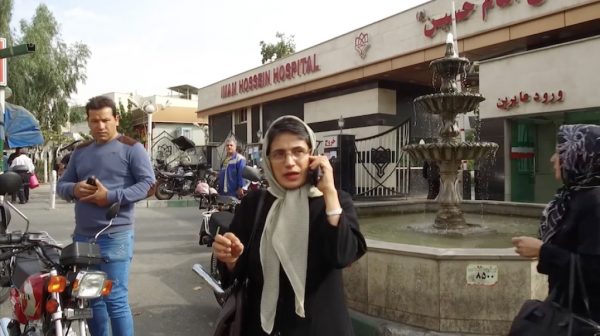
On a wider scale, Nasrin was a signatory to the Campaign for One Million Signatures, an initiative aimed at collecting the support of one million women to petition the government for the elimination of laws aimed at discriminating against women. She would later defend many of the women who were arrested for their involvement in the campaign. In a similar vein, Nasrin also stood up in support of those who were arrested in a government crackdown against protestors of Iran’s disputed 2009 election results that brought the brutal regime of Mahmoud Ahmadinejad to power. Clearly, she’s not been one to back down from a fight – and always doing so with a cool, calm and collected head.
Such courage and personal fortitude seem to have always come easily to Nasrin. She has long been involved in a variety of efforts where she has openly spoken her mind, much to the consternation of Iranian officials. This resulted in a raid on her office in 2010 while defending a client accused of security offenses, an incident that led to charges being filed against Nasrin for spreading propaganda and conspiring to harm state security. She was subsequently sentenced to jail time in Iran’s notorious Evin Prison, a term that was later reduced and resulted in her early release in 2013.
But that was not the end of the governmental harassment. In 2018, halfway through the filming of this documentary, Nasrin was arrested again, this time on a number of charges, including membership in a human rights organization, threatening national security, and “stoking corruption and prostitution,” accusations that led to conviction and sentencing of 38 years’ prison time and 148 lashes. It’s believed that her efforts to confront the government’s position on the practice of wearing hijabs in public contributed significantly to this campaign against her. Efforts to secure her release for this act of governmental overreach have been instituted, but Nasrin remains imprisoned at this time.
The passion that Nasrin has brought to her work also seems to have come naturally to her in her dealings with others outside the courtroom. That’s perhaps most apparent in her loving home life with her husband, Reza Khandan, and her two children, Mehraveh and Nima. But it can also be seen in meetings with her clients, such as Narges Hosseini, a young woman on trial for her defiance to publicly wear a hijab. In addition, Nasrin is a passionate supporter of the arts, believing it to be a cause that deserves greater support, one that authorities should encourage instead of its relentless campaigns of pointless persecution. When seeing how fervently Nasrin throws herself into these endeavors, it’s easy to see how that passion translates into the zeal for her work.
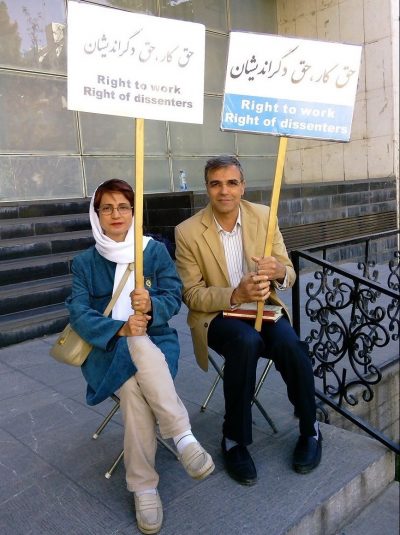
Those qualities of courage and passion are essential at a time like this in Iran. In a nation where the youth is growing increasingly disenchanted with a government determined to squelch expression and opposition, the population needs advocates who will heroically step forward to represent them and fight for their rights and freedoms. Nasrin is a shining example of this, and she and those like her need to be able to live out their destiny and help those seeking a better future, free of tyranny and repression.
When someone seeks assistance with their legal issues, they often call upon individuals who possess the kinds of qualities that Nasrin so freely and naturally exhibits. And those attributes come to her so readily because she’s firmly rooted in the beliefs that drive them. That’s key to making the conscious creation process function, the philosophy that maintains we manifest the reality we experience through the power of these metaphysical resources. It’s unclear whether she has ever heard of this doctrine – she even admits in the film that her spiritual practices are a personal matter that is no one else’s business – but, based on her track record, it’s apparent she has become masterful at its principles.
Nasrin’s passion for her convictions is a direct result of the beliefs that underlie it. She understands the need to fight for the rectification of the many wrongs that have been thrust upon the Iranian people, be they legal and/or moral in nature. She’s unwilling to accept the dictates and judgments that have been and continue to be inflicted upon her peers. She also recognizes that circumstances have to change, in large part because young Iranians increasingly won’t stand for it. Fortified by such resolve and backing, it’s easy to forge beliefs and engage in activities to pursue the fulfillment of these objectives.
It’s apparent that many others agree with her, too, including some that may seem to be unlikely supporters. Such is the case with the parents of one of her clients, Narges Hosseini, a young woman arrested for failure to wear a hijab in public. Even though Narges is convinced of the validity of her radically defiant stance, she comes from a family with a more conventional and compliant background. Nevertheless, despite this seeming disconnect, the family supports both Narges for her commitment and Nasrin for her fierce determination to defend their daughter. They know Nasrin believes in what she says and that she will do everything in her power to defend her client and her position.
Nasrin’s passion for her work owes much to her ability to face her fears and live heroically. This is key to becoming a proficient conscious creator, for fears often hold us back from proceeding with our plans, and beliefs in it generally contradict (and consequently cancel) anything we attempt to undertake. Through her work, Nasrin has not hesitated to publicly express her views, even in the face of an autocratic government and legal system in full knowledge of what could (and did) happen to her for doing so. That makes her a force to be reckoned with, someone who, in the opposition’s view, must be dealt with harshly if her opinions are to be suppressed, conditions that don’t deter her, despite the consequences.
This passion is also attributable to who she is as a person, as the film so clearly shows, especially in her life outside her professional pursuits. The warmth she shares with her family, her demonstrable concern for her clients and her devotion to the arts – all of which are amply depicted here – give viewers a window into her character. And these qualities translate not only into the approaches she takes to her personal life, but also into her professional life. It’s no wonder that others place so much confidence in her and her abilities; they know she’s committed and will give her all for their cases.
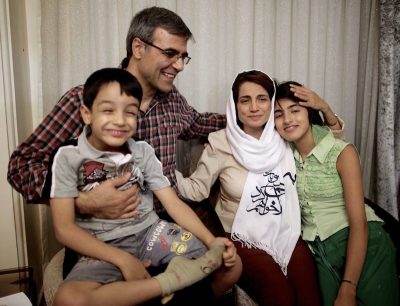
By remaining committed to this stance, Nasrin is clearly practicing her own form of value fulfillment, the conscious creation concept associated with us being our best, truest selves for the betterment of ourselves and those around us. Nasrin’s willingness to put herself on the line for her principles, even in the face of dire consequences, demonstrates her commitment to her causes. She sees it as her destiny, her purpose in life, and, considering what she’s up against, it’s a perilous course, to be sure. But, given what’s at stake, it’s a noble pursuit that she feels compelled to follow, one that, when successful, will benefit many individuals in need of relief and support from their travails.
“Courage under fire” is an expression that could best be used to describe the subject of this superb film. Director Jeff Kaufman’s excellent documentary looks at Nasrin’s heroic life, chronicling the many challenges she has faced and unflinchingly depicting the stalwart defiance she has demonstrated in the face of odds frequently stacked against her. The film candidly and sensitively illustrates the counselor’s family life, her involvement in the arts community, and the heartfelt compassion she genuinely feels for her clients and causes, proof of the authenticity that fuels her actions. It also includes interviews with colleagues and those who have spoken with her over the years, such as journalist Ann Curry, director Jafar Panahi (who featured Nasrin in a cameo in his film “Taxi” (2015)), Iranian activist and human rights attorney Shirin Ebadi, and European Parliament member Marietje Schaake. Clandestinely shot by film crews in Iran under the threat of prosecution and narrated by Oscar winner Olivia Colman, “Nasrin” paints a truly remarkable portrait of a truly remarkable individual. The film is available on DVD and online streaming.
Rising up against formidable opponents is, no doubt, a daunting prospect, especially when the chances of success are far from guaranteed. Yet, given what’s at stake, it’s often necessary if change is ever going to come. Fortunately, there are advocates who agree to take on such challenges, to fight for what they know is right. And, even when there is little chance of victory, putting such transgressors under the spotlight of public scrutiny can go a long way toward effecting change. Nasrin Sotoudeh is one such activist, and we should be grateful, both for her and for this film that so compellingly tells her story.
Note: For more on Nasrin, check out a Mission Unstoppable interview by host Frankie Picasso and yours truly with director Jeff Kaufman and producer Marcia Ross, available on video by clicking here or via podcast by clicking here. And, to help support Nasrin, click here.
Copyright © 2021, by Brent Marchant. All rights reserved.
You may not have heard of Nasrin Sotoudeh, but she has had quite an impact. As one of the most courageous and outspoken human rights advocates in Iran, she has fought to defend those without a voice against a harsh authoritarian regime, at great personal cost. Her story is now the subject of the new documentary "Nasrin," and that film provides the focus of the next episode of The Good Media Network's Mission Unstoppable podcast. Join host Frankie Picasso and yours truly tomorrow, March 18, at 1 pm ET, for an interview with director Jeff Kaufman and producer Marcia Ross about their film and the courageous attorney's work. Tune in on Facebook Live by clicking here for a fascinating discussion.
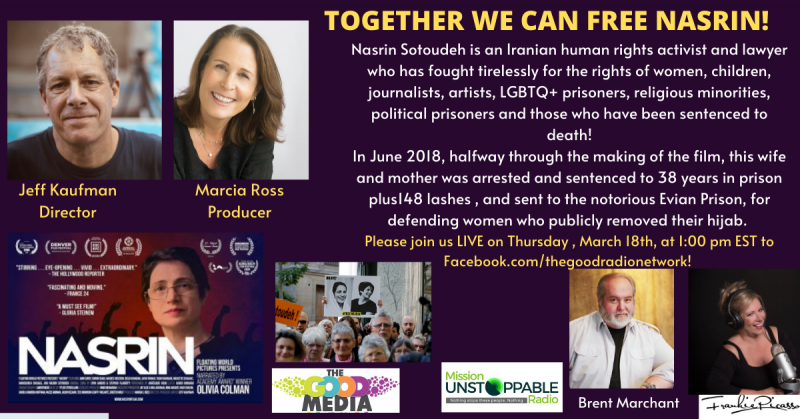
“Minari” (2020 production, 2021 release). Cast: Steven Yeun, Yeri Han, Alan Kim, Noel Kate Cho, Yuh-jung Youn, Will Patton, Ben Hall, Jacob Wade, Darryl Cox, Esther Moon, James Carroll, Eric Starkey, Tina Parker, Jenny Phagen, Scott Haze. Director: Lee Isaac Chung. Screenplay: Lee Isaac Chung. Web site. Trailer.
Wishing for a better tomorrow is one of the most seductive pursuits we can follow. But actually making it happen takes more than just idle pondering. It requires us to envision what we want and to have faith that it can materialize for us. Are we willing to put in the work – both hypothetically and tangibly – to see through on its realization? That’s what a family seeking a better life is faced with in the moving, heartwarming domestic drama, “Minari.”

The American Dream – a life brimming with optimism and opportunity for personal and economic success – is something most of us aspire to, especially those of immigrant backgrounds. And, in the economic boom of the 1980s, it was something that was seemingly on everyone’s mind. So it was for the Yi family, who emigrated to the U.S. from South Korea in search of a better life.
Korean-born Jacob (Steven Yeun) and Monica (Yeri Han) arrived in this country in California, where they spent a number of years working as chicken sexers, separating male and female chicks at a hatchery. While working there, they became the parents of two American-born children, Anne (Noel Kate Cho) and David (Alan Kim), a youngster with a congenital heart problem. They established themselves well, but that existence wasn’t enough for Jacob; he wanted more, to chase the American Dream by making a life for himself and his family as a farmer, something he could not economically afford in high-priced California. So, to make this happen, he pursued another option – to relocate himself and the family to rural Arkansas, home of some of the country’s richest soil and lowest land prices, a place where he could establish his own 50-acre homestead.
The film opens with the family’s arrival in Arkansas. The verdant landscape and big open skies in many ways epitomize the notion of God’s Country. But, despite such a beautiful setting, the transition of moving from California to Arkansas proves to be an uneasy one. While Jacob is truly in his element, Monica struggles to adapt. The idea of living in a mobile home propped up on cinder blocks, for example, is not to her liking, having become more accustomed to an urban existence on the Coast. She’s also concerned about the remoteness of their location, far removed from many of the essentials of life, such as the children’s school and a hospital capable of caring for David’s condition. Adjusting, it seems, is going to be more of a challenge than she thought it would be.
To generate funds to get the farming operation under way, Jacob and Monica draw upon their work experience and take jobs as chicken sexers at a local hatchery. It’s here where the reality of their new community sinks in for Monica; given the dearth of other Koreans, save for Monica’s co-worker Mrs. Oh (Esther Moon), she begins to see how culturally isolated she is. The locals generally appear to be warm and welcoming, but backhanded prejudices slip through occasionally (though, in all fairness, more likely out of ignorance than malice). Nevertheless, these conditions add to the discomfort Mrs. Yi experiences, prompting her to long for the family’s days in California – and making her wonder whether immigrating to the U.S. was a good idea in the first place.
Monica’s anguish soon bubbles to the surface so often that it causes stress in her relationship with Jacob. There’s even talk of her leaving Jacob behind and taking the children to someplace she deems more habitable. But the couple staves off this outcome by coming to a compromise – inviting Monica’s mother, Sounja (Yuh-jung Youn), to come life with them. Having Sounja present would help to provide a cultural cushion for Monica, while giving her someone to help care for the children, affording Anne and David an opportunity to get to know their grandmother better.
Of course, Grandma’s arrival has its share of challenges, too. As much as she adores her grandchildren, Sounja is not exactly the ideal grandmother. She’s got a salty side, and she enjoys her vices, like playing cards and pulling pranks. David isn’t especially thrilled with her presence initially, either, especially when she tries to coerce him into activities like drinking a foul-tasting homemade herbal remedy that she swears will help him with his health condition. In many ways, her arrival is just another log on the fire of adjustment challenges.
As all this unfolds in the household, Jacob keeps his distance by throwing himself into getting the farm up and running. This task takes much of his time and ever-increasing amounts of cash, and it’s a lot of work. Fortunately, Jacob has much-needed help from a farmhand, Paul (Will Patton), a fundamentalist Christian who perpetually praises God and routinely thanks Jacob for the job opportunity. Together this unlikely duo toils to get the fields tilled, planted and watered to produce the Korean vegetables Jacob grows. He hopes that the distinctiveness of his crops will help to distinguish his product with buyers in nearby markets, like Tulsa, where there’s greater demand for more unconventional wares, including those to suit the tastes of the city’s Korean community.
As much hard work as Jacob puts into raising his crops, though, there’s one that grows like a weed with virtually no attention paid to it – a patch of minari planted alongside a nearby shaded creek bed. In fact, the minari patch wasn’t even Jacob’s idea; it was Sounja’s brainchild. When she discovers the site for the planting, she muses about the crop’s ability to proliferate, as well as its many uses as everything from a mood elevator to a healing substance to a culinary ingredient. The parsley-like plant is a sort of agricultural wonder, but it’s one whose value is often overlooked, probably because of its abundant, weed-like growth. Sounja recognizes its benefits, though, even if Jacob doesn’t, so she’s generally left to tend to this planting herself (not that it requires much attention to begin with).
As the family works through its personal and professional challenges – of which more arise as their story plays out – they go through a variety of changes, some for the better, some not. The American Dream, it appears, is more elusive than imagined, perhaps even verging more on “the American Myth.” As much as everyone tries to pull together, there are just as many elements that threaten to tear them apart. But, all problems aside, there is always hope and the potential it carries to bring about a suitable resolution. And maybe, if the family sprinkles a little minari on it, that result just might grow.
Embarking on a fresh start can be a daunting prospect. Doing so frequently involves charting new and uncertain territory, much of which we’re likely to have little familiarity. However, that’s often the case when we willingly choose to leave the past behind in favor of something new. And, because of that, we had better prepare ourselves as best we can – not necessarily for the particulars involved in such a venture (though that certainly helps), but at least in terms of being ready for the types of conditions we’re likely to face – challenges, the unexpected, hardship and so forth.
This comes about to a great degree in terms of what we believe, the foundation of the conscious creation process, the philosophy that maintains we manifest the existence we experience through the power of these intangible metaphysical resources. What we put in place in this regard is crucial, for its outcome draws directly from it, and that’s important when looking to establish a fresh start.
Perhaps the most important aspect in this is envisioning what we hope to achieve, and, from this standpoint, Jacob seems to have a good handle on what he’s looking to create. He may not have anticipated every aspect of his dream, nor may he have envisioned all of the challenges he’d face. But he knows that fulfilling the American Dream is what he’s after. He also has an affinity for the land, something that writer-director Lee Isaac Chung has observed that many Koreans – immigrants or otherwise – share, a trait that naturally draws Jacob to want to become a farmer. So, with those qualities and ambitions in place, Jacob puts the beliefs in place required to see his dream fulfilled. He may not have heard of conscious creation, but it’s apparent he has a good grasp on its concepts and what it takes to make it work for his situation.
Given how Jacob works through his challenges – no matter how daunting they may seem – he obviously has tremendous faith in his beliefs. That’s significant, because faith goes a long way toward cementing us in our beliefs and convictions. And faith is something that seems to come quite naturally to Jacob and his family, as evidenced by their regular church attendance and the place that religion occupies in their lives. It follows that this is something that should also find its way into their beliefs otherwise.
That’s crucial, too, especially when that faith is tested, as it often is during the many challenges they face with adjustment, the farming venture, David’s health and the new living arrangements with Sounja, to name a few. Developments like these may sometimes seem like random, unwanted hardships, but they often show up in our existence as a means to determine our resolve, to get us to see just how badly we want what we claim to seek. New ventures frequently require sacrifice and considerable effort, qualities that often turn out to be commensurate with the rewards that come from them. To appreciate their manifestation, however, we must also often ask ourselves, “Is this really what we want?” In many cases, though, the ordeals generally provide us with the answers. If we truly want the results we profess, we’ll figure out ways to address these considerations – and come up with beliefs to successfully work through them.
In all of these endeavors, we usually obtain the best results when we’re authentic with ourselves. This calls upon us to tap into our sense of personal integrity, no matter what that might involve and how it’s reflected in our manifesting beliefs. Jacob, for instance, exudes authenticity when it comes to his beliefs about what he hopes to achieve. The same can be said for Monica regarding her dissatisfaction with the family’s new living arrangements. And that disconnect between them, as becomes apparent, proves to be a source of heated conflict. It may not be a desirable situation, but at least they’re both being honest with one another, and that’s an essential starting point for them if they ever hope to find a solution that’s going to satisfy everyone. Such authenticity is an integral element for coming up with workable beliefs to arrive at that outcome.
There are, of course, clues as to what’s called for in circumstances like this, and one of Jacob’s crops ironically provides symbolic inspiration. Whether or not the family recognizes it as such, the minari patch, with its prolific yield, serves as an enlightening example. It grows abundantly under the harshest of conditions, and it provides the means to address an array of issues, be they health-related, emotional in nature or culinary. It’s almost as if the plant is eager to help, as if it’s got an innate quality of compassion to serve, to solve problems and to bring about helpful results. It’s almost as if it’s an agricultural metaphor for the love that binds all things, including the members of a family in crisis – people who care about one another and can work together to help each other sort out their problems for the betterment of everyone. And, when viewers see the bumper crop growing in the creekside bed, there’s considerable inspiration that can be drawn from that image – if only the family will allow themselves to see it as well.
This is important for those of us in the viewing audience, too. When we look at our fractured society these days, it’s crucial that we seek ways to heal it if we hope to survive. The squabbles that have come to set us apart – many of them overblown and inherently petty at that – must be resolved, and the healing balm that comes from our own personal versions of minari need to be tapped if we ever hope to realize such an outcome. This film provides us all with an enlightening and inspiring example to follow. Let’s hope we’re paying attention.
Should it be nominated, this is the movie that deserves to win the Oscar for best picture, flat out, hands down, no questions asked. Director Chung’s heartfelt semi-autobiographical drama is just the kind of movie that we need right now (much as “Moonlight” was the film we needed in 2016). The authenticity that pervades the narrative is truly astounding, never presenting a moment that seems forced or out of place. The picture’s exquisite cinematography, nuanced script and narrative, and superb ensemble cast make for a moving cinematic experience that leaves viewers with a warm glow that lasts long after the movie’s final frame. Richly deserving of the many accolades and award nominations it has received thus far, “Minari” truly stands out among this year’s field of contenders, masterfully and lovingly handled in virtually every respect. I can’t speak highly enough about the quality of this film and its power to affect us, especially when it comes to helping heal an ailing nation. The film is playing in limited theatrical release and is available for online streaming.
“Minari” has received numerous accolades thus far, with more almost certainly to come. The picture was named an American Film Institute Movie of the Year and received a Golden Globe Award for best foreign language film. It also fared well with the National Board of Review, where it was named a Top 10 film and captured awards for best director and supporting actress (Youn), and in the Critics Choice Award competition, in which it was named best foreign language film and received the award for best young actor (Kim), along with eight additional nominations (best picture, ensemble, original screenplay, cinematography, score, director, actor (Yeun) and supporting actress (Youn)). In upcoming competitions, the film has earned three Screen Actors Guild Award nominations (best ensemble, actor (Yeun) and supporting actress (Youn)), six BAFTA Award nods (best foreign language film, supporting actor (Kim), supporting actress (Youn), director, score and casting) and six Independent Spirit Award nominations (best picture, director, screenplay, actor (Yeun) and supporting actress (Youn and Han)).
Having faith in ourselves and each other sometimes calls for considerable effort – so much so, in fact, that it might seem easier to throw in the towel. But, in the end, what would that accomplish, especially if we have goals we wish to achieve, objectives that are nearly always part of attaining that sought-after better tomorrow? That’s when we need to tap into our reserves of resolve. And, for good measure, we just might want to throw in a little minari, too.
Copyright © 2021, by Brent Marchant. All rights reserved.
John Guillerman is probably one of the most prolific yet least known filmmakers of the 20th Century, though if you've ever seen or heard of movies like "The Towering Inferno," "The Blue Max," "Death on the Nile" and "King Kong" (1976), you obviously know of his work. In a loving tribute to the late director, Guillerman's widow, Mary, has written a new memoir, John Guillerman: The Man, The Myth, The Movies, which serves as the subject of the next episode of The Good Media Network's Mission Unstoppable podcast. Join host Frankie Picasso and yours truly tomorrow, March 11, at 1 pm ET, for an interview with Mary Guillerman about her new book and the life and work of one of the most famous filmmakers no one has ever heard of. Tune in on Facebook Live by clicking here for a fascinating discussion.
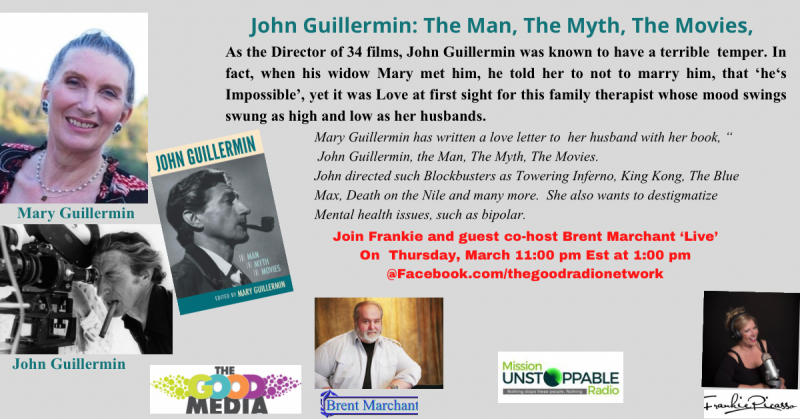
Tune in for the latest Cinema Scribe segment on Bring Me 2 Life Radio, Tuesday, March 9, at 2 pm ET, available by clicking here. And, if you don't hear the show live, catch it later on demand, now available on Sound Cloud and Amazon!
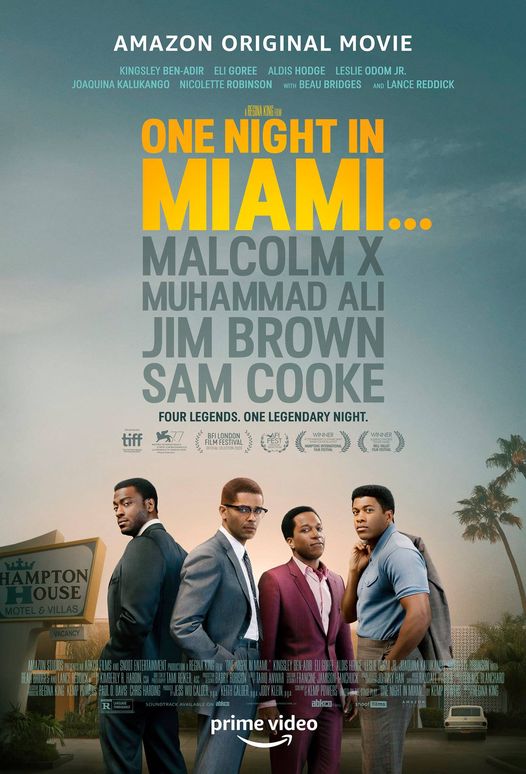
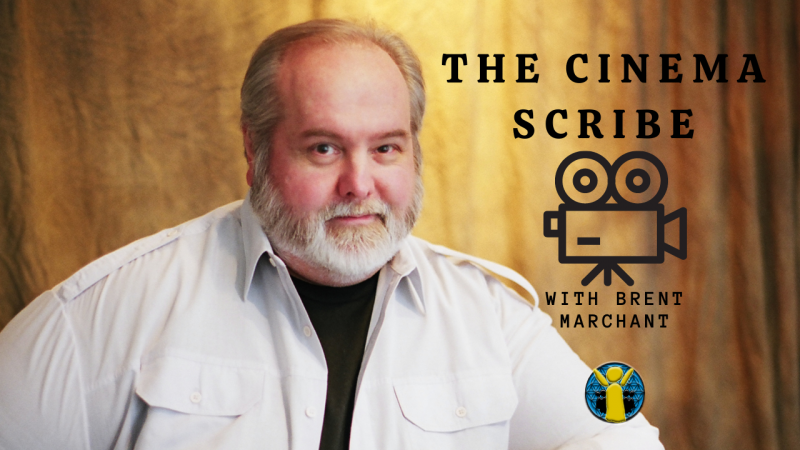
My list of the year’s best and worst in cinema might be coming a little late “this year,” but, then, this was unlike any other “year” that preceded it – especially since, based on distribution schedules, it ended up being longer than 12 months and included offerings whose release dates differed markedly from what was originally planned. That’s played havoc with what’s been made eligible for “2020” awards consideration, given that some haven’t come out until 2021 while others originally debuted in 2019 but had their wide-scale distribution plans altered. Some films vying for 2020 awards consideration have not even gone into general release as yet. And, even though I have seen most of this year’s major releases and awards contenders, in the interest of full disclosure, I must confess that there are some offerings I haven’t screened thus far (and have not been considered in the compilation of this list).
So, with that said, here’s what made my Top 10 and Bottom 10 for “2020,” along with my 10 honorable and dishonorable mentions and a handful of other films that I’ve deemed noteworthy or forgettable. I have included both domestic and foreign offerings in these lists, but I have not included documentaries, as I will address those films in a separate blog entry.
Enjoy the list!
The Top 10 Countdown
10. “Blackbird” (USA/UK)
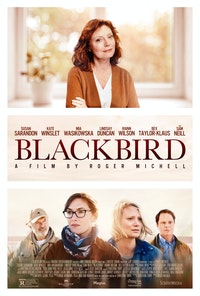
The right to die is one of those topics that tends to divide moviegoers along rigidly defined lines, and that’s very likely going to be the case when it comes to opinions about “Blackbird,” an American remake of the 2014 Danish offering “Silent Heart.” When a woman seriously afflicted with ALS sees what lies ahead for her, she decides to gather her family together for a final holiday celebration – and a celebration of life – as a prelude to ending her earthly existence. It’s a time to finish unfinished business, to say what’s gone unsaid and to reverently honor our power of choice. This touching, thought-provoking, deeply moving drama examines the dynamics within a family wrestling with this notion while honestly and lovingly addressing the heartfelt feelings associated with such a profound and intentional choice. While a few story elements don’t work quite as well as they probably could have, most of the narrative is handled sensitively and realistically, all brought to life by the superb performances of its stellar ensemble, particularly Susan Sarandon, Sam Neill, Mia Wasikowska and Lindsay Duncan. Director Roger Michell’s latest will obviously disturb some viewers, but others, like yours truly, will be deeply moved – and poignantly reminded that what we do with our lives (especially in the now) is up to us and no one else’s business.
9. “God of the Piano” (Israel)
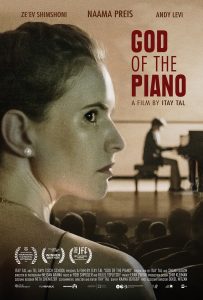
This taut psychological thriller about a gifted pregnant pianist who wants the family’s musical legacy to be carried on through her unborn son takes a dramatic twist when the child is born deaf, prompting his obsessive mother to take drastic steps to keep the dream alive. Israeli director Ital Tal’s debut feature packs quite a suspenseful punch in its 80-minute runtime, especially in its remarkable ability to move the story along more by deeds than words. The film’s excellent ensemble and superb score (much of it original) bring this captivating and compelling story to life, keeping viewers on the edge of their seats right up to the end. A surprising gem of a movie that’s well worth your time.
8. “The Forty-Year-Old Version” (USA)
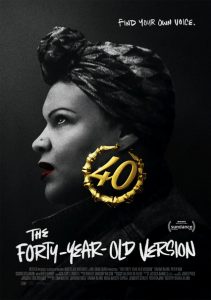
Web site. Trailer. Blog (to come).
Critics Choice Awards – nominee, best comedy
Independent Spirit Awards – nominee, best first feature
National Board of Review – winner, Spotlight Award (Radha Blank), Top 10 Films
When a 39-year-old playwright’s career has woefully stalled for a decade, what does she do to get it back on track before turning 40? She decides to reinvent herself and become a rapper, one whose works reflect the views of a 40-year-old plus-size single Black woman struggling to get by – and with hilarious (and I do mean hilarious) results at that. The debut feature from writer-actor-director Radha Blank is one of the most refreshingly honest comedies to come along in quite some time, serving up big laughs throughout its two-hour runtime while simultaneously offering poignant insights about the New York theater community, society at large, being authentic with oneself and growing older. The narrative becomes admittedly a little stretched out in the second hour, but, with everything else it has to offer, who cares? Sensitive viewers are cautioned that the salty language in this one is enough to make a sailor blush, but it only serves to make the laughs even bigger throughout. Blank is off to a tremendous start with this project; let’s hope she keeps it up in future releases.
7. “Apples” (“Mila”) (Greece/Poland/Slovenia)
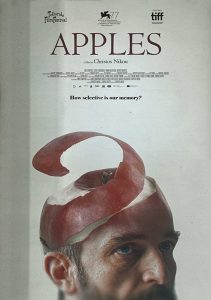
National Board of Review – winner, Top 5 Foreign Films
Director Christos Nikou is off to a fine start with his debut feature about an amnesia sufferer who struggles with trying to get his memory back while simultaneously attempting to get on with his life in case he can’t. This suspenseful, nuanced and engaging meditation on the nature of memory and the selectivity of its retention will keep viewers guessing from start to finish, all the while serving up heaping helpings of wry humor and cleverly dangling clues before our eyes that may or may not prove integral to solving the mystery of this intriguing conundrum. The film mirrors the eccentricity of directors like Yorgos Lanthimos and Charlie Kaufman, presents a puzzle not unlike that found in Christopher Nolan’s “Memento” (2000), and successfully incorporates the kind of deadpan laughs characteristic of releases like Hal Ashby’s “Being There” (1979). The film’s inventive, tautly assembled script, written by Nikou and Stavros Raptis, deservedly captured the Chicago Film Festival’s Silver Hugo Award for best screenplay. Indeed, if this is what Nikou has to offer in his first major outing, I can’t wait to see what he comes up with next.
6. “There Is No Evil” (“Sheytan vojud nadarad”) (Iran/Germany/Czech Republic)
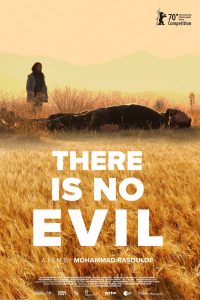
“Remorse,” “regret” and “defiance” are words most of us would not readily associate with executioners, but they’re more than apropos when it comes to the characters in director Mohammad Rasoulof’s latest, “There Is No Evil.” This collection of four vignettes about the lives of executioners placed into situations bigger than themselves examines how these individuals cope with their circumstances, revealing feelings that those in this grim profession aren’t supposed to possess. While there are occasional pacing issues and a slight tendency for the filmmaker to wear his heart on his sleeve, these minor flaws are easily overlooked in the wake of the picture’s numerous other strengths. A surprisingly insightful offering.
5. “The Trial of the Chicago 7” (USA/UK/India)
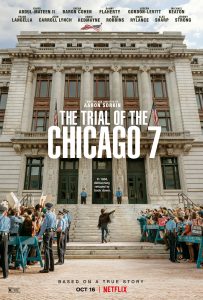
Golden Globe Awards – winner, best screenplay
Golden Globe Awards – nominee, best dramatic picture, best director, best original song, best supporting actor (Sacha Baron Cohen)
Screen Actors Guild Awards – nominee, best cast, best supporting actor (Sacha Baron Cohen)
American Film Institute – winner, Movie of the Year
Critics Choice Awards – nominee, best picture, best director, best original screenplay, best editing, best acting ensemble, best supporting actor (Sacha Baron Cohen)
While this superb docudrama takes some liberties with the facts of this landmark court case, writer-director Aaron Sorkin’s latest offering gets much of it right, with what it invents making for some damn good theater. Admittedly, the picture is a tad talky in the first half hour, but that shortcoming is covered well by the film’s stellar cast, including Sacha Baron Cohen, Mark Rylance, Eddie Redmayne, Jeremy Strong, John Carroll Lynch, Frank Langella, Joseph Gordon-Levitt and Michael Keaton. And, once the picture hits its stride, it’s a compelling watch from that point forward. The relevance of this story is by no means lost in light of the current sociopolitical climate, and the picture’s October 2020 release couldn’t have been more serendipitous. This is one we should all see – and make a point of embracing its message.
4. “One Night in Miami…” (USA)
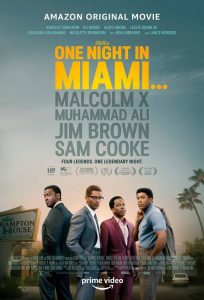
Golden Globe Awards – nominee, best director, best original song, best supporting actor (Leslie Odom Jr.)
Screen Actors Guild Awards – nominee, best cast, best supporting actor (Leslie Odom Jr.)
American Film Institute – winner, Movie of the Year
Critics Choice Awards – nominee, best picture, best director, best adapted screenplay, best original song, best acting ensemble, best supporting actor (Leslie Odom Jr.)
Independent Spirit Awards – winner, Robert Altman Award, best ensemble cast
National Board of Review – winner, Freedom of Expression Award
Based on Kemp Powers’s play by the same name, filmmaker Regina King’s directorial debut about a historic 1964 meeting among activist Malcolm X, boxing great Cassius Clay, football star Jim Brown and singer-producer Sam Cooke on the night of Clay becoming world champ explores the state of the civil rights movement at the time and how each of them viewed its future and their role in it. This captivating look at the movement from the inside presents a balanced examination of the four friends’ views on the subject, including both their areas of concurrence and disagreement and how those pointed opinions had the potential to either tear them apart or bring them together. The excellent ensemble cast of Kingsley Ben-Adir, Eli Goree, Aldis Hodge and Leslie Odom Jr. enlivens the superbly penned screenplay, giving the picture a crackling intensity that’s tautly sustained throughout. And, despite a few stagey segments, this is arguably one of the best theatre-to-screen translations I’ve ever seen, effectively opening up the source material and giving it breathing room that such adaptations often lack. King has indeed produced a magnificent work here, handily serving up the right picture for our times, one that gives us all much to ponder in terms of where we are and where we go from here.
3. “Sound of Metal” (USA)
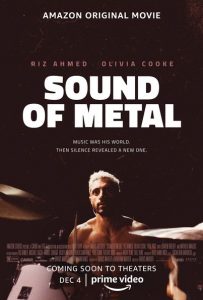
Golden Globe Awards – nominee, best dramatic actor (Riz Ahmed)
Screen Actors Guild Awards – nominee, best dramatic actor (Riz Ahmed)
American Film Institute – winner, Movie of the Year
Critics Choice Awards – nominee, best picture, best original screenplay, editing, best actor (Riz Ahmed), best supporting actor (Paul Raci)
Independent Spirit Awards – nominee, best first feature, best actor (Riz Ahmed), best supporting actor (Paul Raci)
National Board of Review – winner, Top 10 Films, best actor (Riz Ahmed), best supporting actor (Paul Raci)
When our dreams and the life we know evaporate in an instant, we may find it next to impossible to adjust, as is the case in this engaging drama about a heavy metal drummer who is faced with losing his hearing. While this offering has a little trouble finding its footing at times, it nevertheless takes audiences through the challenges associated with hearing loss and a recovering addict’s struggle to maintain sobriety in the wake of profound change. The film also skillfully delves into matters of adaptability and self-acceptance, as well as learning how to see “disabilities” as differences, not handicaps, qualities with the potential to give us new and unconsidered perspectives on life. All of this is brought to life through the fine performances of Riz Ahmed, Olivia Cooke and Paul Raci, as well as an inventive sound design that truly makes an impact on viewers. Director Darius Marder’s debut narrative feature is one of the year’s best.
2. “Two of Us” (“Deux”) (France/Luxembourg/Belgium)
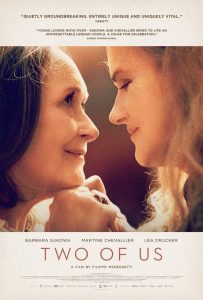
Web site. Trailer. Blog (to come)
Golden Globe Awards – nominee, best foreign language film
Critics Choice Awards – nominee, best foreign language film
How and who we love has undergone tremendously liberating changes in recent years, but, for some seniors, who remember a time when such taboos could not be revealed, the past painfully lingers on into the present. So it is for an aging French woman who is unable to bring herself to tell her adult children about her lesbian partner, leaving her longtime lover on the sidelines when a tragic event disrupts their happiness and lives together. Director Filippo Meneghetti’s debut narrative feature is an intensely gripping and moving work, one that grabs viewers by the collar and makes the frustration experienced by its protagonists truly palpable – and infuriating. The superb performances by Barbara Sukowa and Martine Chevallier are riveting and heartfelt, achieving powerful impact with gestures as simple as facial expressions and piercing views into their eyes. There are a few incidents in the narrative that seem a bit far-fetched, but they’re compensated for by everything else this release has to offer. The pain, romance and warmth of this one must be experienced by anyone with a conscience – or a pulse – to see that, no matter how far we have come, there’s always more ground still to be made up when it comes to openly express our feelings for the one we love.
1. “Minari” (USA)
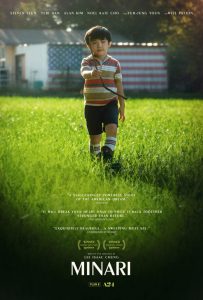
Web site. Trailer. Blog (to come)
Golden Globe Awards – winner, best foreign language film
Screen Actors Guild Awards – nominee, best cast, best actor (Steven Yeun), best supporting actress (Yuh-jung Youn)
American Film Institute – winner, Movie of the Year
Critics Choice Awards – nominee, best picture, best foreign language film, best director, best original screenplay, best cinematography, best score, best acting ensemble, best actor (Steven Yeun), best supporting actress (Yuh-jung Youn), best young actor/actress (Alan S. Kim)
Independent Spirit Awards – nominee, best feature, best director, best screenplay, best actor (Steven Yeun), best supporting actress (Yuh-jung Youn), best supporting actress (Yeri Han)
National Board of Review – winner, Top 10 Films, best original screenplay, best supporting actress (Yuh-jung Youn)
This is the movie that should win the Oscar for best picture, flat out, hands down, no questions asked. Director Lee Isaac Chung’s heartfelt domestic drama about a South Korean immigrant family seeking a fresh start and a better tomorrow in 1980s rural Arkansas is just the kind of movie that we need right now, much as “Moonlight” was the film we needed in 2016. The picture’s exquisite cinematography, nuanced script and narrative, and superb ensemble cast make for a moving cinematic experience that leaves viewers with a warm glow that lasts long after the movie’s final frame. Richly deserving of the many accolades and award nominations it has received thus far, “Minari” truly stands out among this year’s field of contenders, masterfully and lovingly handled in virtually every respect. I can’t speak highly enough about the quality of this film and its power to help heal an ailing nation.
Honorable Mentions
11. “Driveways” (USA)
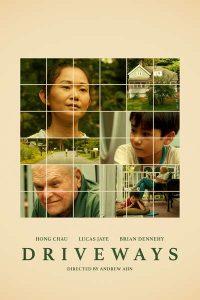
Independent Spirit Awards (2020) – nominee, best first screenplay, best actress (Hong Chau)
National Board of Review (2021) – winner, Top 10 Independent Films
A gentle, touching story about a lonely 8-year-old boy and his single mother who travel out of town to empty the house of a recently deceased relative and end up befriending their late relation’s next-door neighbor, a widowed 80-something Korean War vet. This moving tale exudes warmth as the three lonesome protagonists grow close to one another, filling a huge void in each other’s lives. However, director Andrew Ahn’s latest is far from an exercise in schmaltz or obvious manipulation. Though some of the picture’s themes are familiar, they’re often handled in unconventional ways and always addressed with deft skill and subtlety. There are a few elements that could have used a little further development, and the ending – though effective – seems to come somewhat suddenly. However, these shortcomings aside, “Driveways” is a genuine pleasure, especially for its performances (most notably that of Brian Dennehy in one of his last roles). It’s a fine offering worthy of its two 2020 Independent Spirit Award nominations, now available for streaming online.
12. “I Care a Lot” (UK)
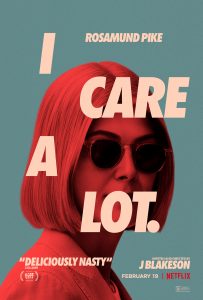
Web site. Trailer. Blog (to come)
Golden Globe Awards – winner, best comedic actress (Rosamund Pike)
Seeing the ugly truth exposed in all its vile splendor may be hurtful and shocking, but sometimes it’s a necessary wake-up call for the betterment of our collective well-being, as this cynical, darkly satirical comedy and social commentary illustrates on the nature of predatory capitalism. When the owner of a shifty legal guardianship agency adept at fleecing wealthy seniors afflicted with mental health issues meets her match in an equally crafty nemesis with nefarious connections, a war of wits breaks out for domination and control of the situation, regardless of who might get hurt in the process. While the film starts to go off the rails somewhat in the second half, its wicked humor makes clear the ruthlessness inherent in the practices of this economic system, both on a personal and a global geopolitical scale. What makes the film, though, are its superb performances, especially those of Rosamund Pike, Dianne Wiest and Peter Dinklage. Some may find the content and message of director J Blakeson’s latest offering troubling, but that’s simply the movie doing its job. It stresses the need for us to shed our Pollyanna attitudes about fairness in business and money matters, no matter how disillusioning that might be. Indeed, it reminds us of the old adage that it’s easier to fool people than to convince them that they’ve been fooled.
13. “Someone Somewhere” (“Deux moi”) (France/Belgium)

How refreshing it is to see an intelligent romantic comedy that entertains and enlightens while successfully breaking all the rules of the genre. The latest offering from French director Cédric Klapisch serves up a warm, funny, smartly written tale that presents fresh, realistic insights on romance without ever becoming schmaltzy or saccharinely sentimental. Leads François Civil and Ana Girardot turn in fine, exceedingly natural performances that are totally believable and never stretch credibility. And then there’s the cinematography, which shows off the beauty of the French Alps and aspects of Paris probably never seen by most outsiders. The film takes viewers on quite an emotional journey on its way to its climax, but the trip is well worth it, providing the basis for a joyful and satisfying conclusion. This is a truly terrific film – don’t miss it.
14. “The Columnist” (“De kuthoer”) (Netherlands)

In an age when anyone seems to feel he or she can say anything about anyone on social media without retribution, it’s easy to understand how someone aggrieved might lose it and want to fight back. So it is for the columnist of a popular Dutch periodical who comes under attack from all directions in an assault of unfair (and patently untrue) cyber-bullying – that is, until she decides to fight back using more than just her words. This expertly directed, superbly well-acted macabre comedy packs quite a laugh- and horror-filled punch, skillfully knowing when to push the tastefulness envelope and when to pull it back, all tinged with just the right amount of camp and social commentary. There is a slight tendency toward heavy-handedness in a few spots, especially near the end, but director Ivo van Aart’s skillful hand keeps it from getting out of control and turning into a lecture. A real Dutch treat that shouldn’t be missed.
15. “Cicada” (USA)

A heart-wrenching look at how two gay male partners in an interracial relationship work together at solving their respective past traumas and how the power of love can significantly aid and smooth the process. This fact-based dramatic love story, written and directed by protagonist Matthew Fifer, is peppered with inventive and whimsical touches of comic relief and featuring an excellent ensemble cast (especially Cobie Smulders as a kooky unconventional therapist) and moves viewers deeply, earning every single bit of empathy that it draws out of audiences. Easily one of the most endearing and honest love stories I’ve ever seen, sexual orientation aside. Don’t miss this one – my top pick from the Reeling Chicago International Gay Film Festival.
16. “Divine Love” (“Divino Amor”) (Brazil/Uruguay/Chile/Norway/Sweden/Denmark)
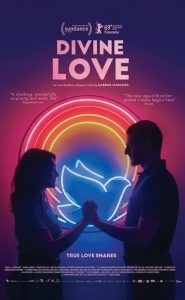
In a Brazil of the near future in which fundamentalist Christianity has insidiously ingratiated itself into what is still a supposedly secular state, elements of the church and its ideology have intrusively invaded virtually every aspect of everyday life, affecting the rights of everyone, including non-believing “infidels.” A society that has welcomed ecclesiastical discos and drive-through pastoral advice centers into its midst has also become one tinged with the faith’s contemporary bureaucracy and beliefs about blasphemy. It’s also one in which unbridled sexuality has been hypocritically rationalized into existence as part of its alleged sacred doctrines. But what happens when those “values” become toppled by unexpected and seemingly miraculous events that don’t jibe with its dogma? That’s what director Gabriel Mascaro’s wickedly biting satire exposes, a humorous but stern cautionary tale of what can happen when religious conformity threatens to become so pervasive that it presents a clear and present danger to a nation’s citizenry. As is the case with many of Mascaro’s films, this offering includes a number of protracted and explicit sex sequences, so sensitive viewers be warned, but their inclusion is all part of the phony piety that goes into the rituals, practices and beliefs of a faith-based movement that essentially rings hollow and deserves to be exposed as such.
17. “The Weasels’ Tale” (“El cuento de las comadrejas”) (Argentina/Spain)
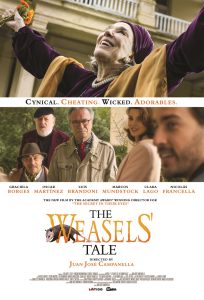
When two millennial con artists take on four movie industry veterans past their prime, the plot thickens as everyone tries to outhustle one another. It doesn’t matter that the once-famous cinema idols are essentially financially destitute and live on a decrepit estate that’s falling apart and overrun by the local wildlife – everybody’s still out to look after himself or herself first. This deliciously devious dark comedy is filled with devilish twists and turns, nicely seasoned with snappy writing, creative photographic effects, superbly campy performances, a spot-on soundtrack and a story line where art imitates life (and vice versa). Director Juan José Campanella’s latest sizzles throughout, nicely paced and crisp in virtually every frame, including those that slyly poke fun at the movie industry through the picture’s narrative. A hilarious morality play that’s a genuine joy from start to finish.
18. “The Last Full Measure” (USA)
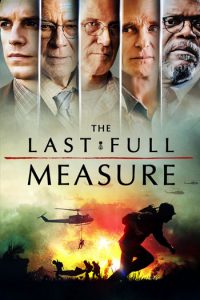
Now here’s a movie that really got the shaft: Between being released in the typical cinematic wasteland that is January (instead of the genuinely more fitting year-end awards season window) and a barrage of smarmy negative reviews by ever-so-cynical critics who are probably too young to remember the horrors of Vietnam (if they were even born during that time), this moving, heartfelt, fact-based story about the efforts to earn a posthumous Medal of Honor designation for a brave Air Force medic killed while saving countless soldiers during one of the bloodiest battles of the war earns every bit of respect and emotion that it brings out of its viewers. With an excellent ensemble cast featuring superb performances by William Hurt, Samuel L. Jackson, Ed Harris, Christopher Plummer and Peter Fonda (in his final performance), director Todd Robinson’s stirring tale tells a compelling, no-nonsense story about heroism, valor and sacrifice and the quest to see those qualities properly recognized (especially since the 30-year delay in doing so was derailed by bureaucratic incompetence and a concerted effort to cover up some dirty little military secrets). Be forewarned that the film contains graphic images that may not be suitable for more sensitive viewers, but the picture never becomes gratuitous in its depictions of wartime events. To be sure, this offering certainly deserved better than it got, both in terms of its distribution schedule and its critical reception. And that’s ironic, for this release ultimately suffered from the same shoddy treatment as its principal subject, a wrong that truly should be made right.
19. “The Life Ahead” (“La vita davanti a sé”) (Italy)
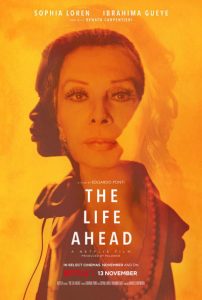
Golden Globe Awards – winner, best original song
Golden Globe Awards – nominee, best foreign language film
Critics Choice Awards – nominee, best foreign language film, best original song, best young actor/actress (Ibrahima Gueye)
Though occasionally somewhat predictable and formulaic, this touching tale about a Holocaust survivor and former streetwalker who takes in and cares for orphans and other cast-aside children shines brilliantly thanks to its outstanding performances and the palpable chemistry of its superb ensemble cast members. As a streetwise, tough-loving mother figure, veteran actress Sophia Loren (in her first feature film role in 10 years) provides a perfect counterpart to a troubled 12-year-old Senegalese immigrant street child played by newcomer Ibrahima Gueye, helping him find his way and giving him the love, nurturing and support he so desperately needs. Director Edoardo Ponti (Loren’s son) serves up a fine effort in his third feature outing. The story here may seem a little familiar at times, but its execution more than makes up for that, with the 87-year-old Loren adding yet another memorable performance to her storied career.
20. “Beasts Clawing at Straws” (“Jupiragirado japgo sipeun jimseungdeul”) (South Korea)
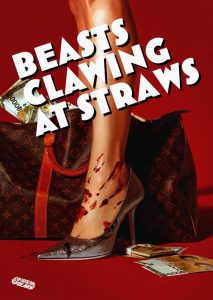
When the films of the Coen Brothers meet those of Bong Joon-Ho, you’ve got the work of first-time South Korean director Kim Yong-hoon, whose debut feature, “Beasts Clawing at Straws,” is an absolute knock-out. This dark crime comedy consistently delivers big laughs, punctuated by a plethora of twists and turns, all brought to life by a superb ensemble of performers who create memorable and colorful characters. The picture has a slight tendency to drag in a few spots, but this is easily overlooked in light of its many, many other strengths. If this picture is any indication of what the filmmaker has in the tank, we can look forward to a bright future of entertaining and engaging releases. Don’t miss the opportunity to see the launch of what is hopefully a promising career.
Noteworthy (in no particular order)
“Nomadland” (USA/Germany). Web site. Trailer.
“The Outside Story” (USA). Web site. Trailer. Blog.
“My Dog Stupid” (“Mon chien Stupide”) (France/Belgium). Web site. Trailer. Blog.
“Song Without a Name” (“Canción sin nombre”) (Peru/Spain/USA/Chile). Web site. Trailer. Blog.
“Bacurau” (Brazil/France). Web site. Trailer. Blog.
“Twilight’s Kiss” (“Suk Suk”) (Hong Kong). Web site. Trailer.
“To the Stars” (USA). Web site. Trailer. Blog.
“Papicha” (France/Algeria/Belgium/Qatar). Web site. Trailer. Blog.
“New Order” (“Nuevo orden”) (Mexico/France). Web site. Trailer.
“The Climb” (USA). Web site. Trailer.
“Da 5 Bloods” (USA). Web site. Trailer.
The Bottom 10 Countdown
10. “Family Members” (“Los miembros de la familia”) (Argentina)
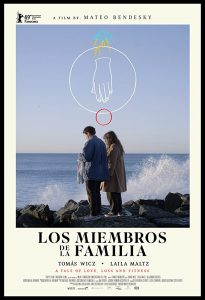
Despite some modestly interesting characters and occasionally intriguing ideas, director Mateo Bendesky’s rambling, minimalist, surreal drama-comedy (a term I’d use very loosely) never (and I do mean never) finds any meaningful traction. While billed as a coming of age/coming out tale with a metaphysical twist (dressed up in a largely snide, smarmy package), this utterly strange, totally directionless mess ambles along toward a hoped-for payoff that’s never reached. Don’t waste your time.
9. “The Midnight Sky” (USA)
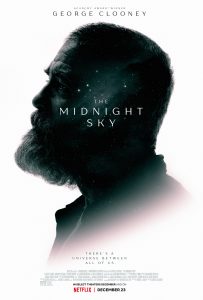
Golden Globe Awards – nominee, best original score
Critics Choice Awards – nominee, best score, best visual effects, best young actor/actress (Caoilinn Springall)
National Board of Review – winner, Top 10 Films
Despite an intriguing premise, flashy special effects and a few touching dialogue exchanges, this overlong bittersweet sci-fi offering about an Arctic scientist trying to warn a returning astronaut crew about an unfolding global catastrophe that’s wiping out the earth’s population trudges along at a glacial pace, subjecting viewers to a litany of cinematic sins as it limps toward its conclusion. Among those transgressions are uneven pacing, implausible action sequences, occasionally odd and inexplicable editing, poor handling of the connection between its two principal narrative threads, unbridled predictability, and a wealth of extraneous material that could have been easily snipped. But perhaps the worst offense is director George Clooney’s boring treatment of the story; it simply lacks the gripping, dramatic nature necessary to make this material work effectively. A major disappointment.
8. “H is for Happiness” (Australia)
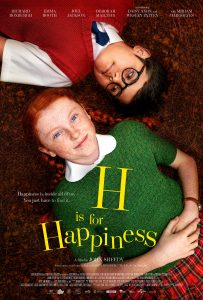
This tweener/young adult tale about an Australian schoolgirl’s noble attempt to save her dysfunctional family from falling apart may have its intentions in the right place, but it most definitely lacks the inherent coherency to make the picture work. Its inconsistent tone, which ranges from delightfully whimsical to annoyingly cheerful to darkly real, leaves viewers often mystified about what it’s trying to say, how it’s trying to say it and, ultimately, why anyone should even care. The look and feel are reminiscent of Tim Burton but without the edge, except for those rare occasions where it goes so completely over the top that it takes its audience unexpectedly into territory seemingly inappropriate for those of an impressionable age. As the story ambles through its choppy, often-incongruous narrative, it’s easy to lose interest in the characters and plot (and not too far into the film either, I might add). Save for some modestly touching moments in the last half hour, there’s precious little to admire here. It’s indeed baffling trying to figure out what director John Sheedy and screenwriter Lisa Hoppe were going for here, but, whatever it was, they sorely missed the mark.
7. “Summer of ʼ85” (“Été 85”) (France/Belgium)
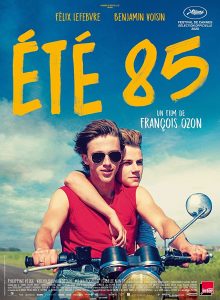
Writer-director François Ozon’s utterly preposterous, vanilla-encrusted “forbidden gay romance” tale is so unbelievably dated and clichéd that it’s unfathomable anyone would have wanted to back this project. With a narrative that plays like so many “homosexual dramas” of the ʼ60s and ʼ70s in which something bad inevitably happens to someone just by virtue of being gay, “Summer of ʼ85” is a trite throwback to those cautionary tales of yore (and, even at that, it’s almost totally lacking in the suspense that made some of those stunningly judgmental, overly prejudicial releases at least somewhat entertaining in their own excessively intolerant way). There is something of a modest camp factor present here, but not nearly enough to make this the parody of those old melodramas that it could have been. Skip this one at all costs.
6. “Save Yourselves!” (USA)
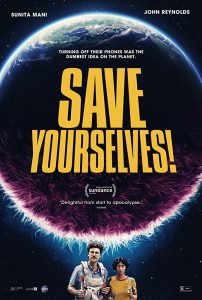
What’s been billed as a hip comedy about a millennial couple trying to personally reconnect with one another in the midst of an alien invasion they know nothing about may be incisive in its social commentary, but it’s virtually devoid of laughs (so where is the comedy?). This overly talky, slowly paced, hyper-analytical debut feature from directors Alex Huston Fischer and Eleanor Wilson is about as entertaining as a root canal. And the real shame here is that this could have been an excellent premise for being both observant and funny. “Save Yourselves!” may indeed be an appropriate title, but mainly as an admonition to would-be viewers to stay away and save themselves the price of admission.
5. “First Cow” (USA)
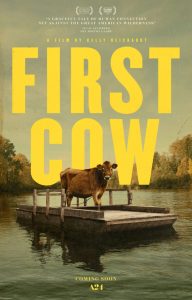
Critics Choice Awards – nominee, best adapted screenplay, best cinematography
Independent Spirit Awards – best feature, best director, best supporting actor (Orion Lee)
National Board of Review – winner, Top 10 Films
I’ve seen life insurance infomercials that were more captivating than this interminably tedious slog. Director Kelly Reichardt’s latest starts out slow and goes downhill from there, telling a story about 19th Century fortune seekers in Oregon Territory that has nothing interesting to say. I’m at a loss to understand why this offering (or most of the filmmaker’s other pictures, for that matter) garner such appeal from critics and diehard fans. While some of the cinematography is indeed gorgeous, much of the film is underlit, and the sound quality is atrocious, making it difficult to understand much of what the characters are mumbling (most of which turns out to be rather inconsequential at that). How this is ending up on so many top 10 lists and receiving so much awards season buzz is totally beyond me.
4. “Wonder Woman 1984” (USA/UK/Spain)

Critics Choice Awards – nominee, best visual effects
Yikes, what a disappointment! This much-anticipated action adventure release misses the mark in so many ways that it’s easy to lose count. The story is frequently derivative, the script plays like it was written by a committee, the action sequences aren’t especially engaging (and a little slow in coming), there are plot holes aplenty, the symbolism is obvious and heavy-handed, there is little to characterize the story (visually or thematically) as to the significance of its 1984 setting, and on and on and on it goes in endlessly lame ways. To be sure, Kristen Wiig delivers a fine supporting performance as a fence-straddling villain, and there are some nice sentiments worked in during the film’s closing moments. But, compared to this film’s far superior predecessor, director Patty Jenkins’s ambitious but disjointed and flawed offering represents a big step backward for the franchise and its future (especially at a time when it can ill afford it). And, by the way, what’s with that outfit Ms. Wiig wears in the closing sequence? It looks like a wardrobe reject from the movie version of “Cats.”
3. “Malcolm & Marie” (USA)
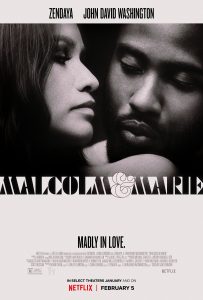
Web site. Trailer.
Critics Choice Awards – nominee, best actress (Zendaya)
Watching this truly abysmal relationship drama is akin to witnessing a horrific traffic accident play out over the course of nearly two hours. As a self-important, self-indulgent, self-aggrandizing vehicle for writer-director Sam Levinson, this 15-round knock-down, drag-out lover’s quarrel with no referee grows tedious and exhausting quickly as the film’s two protagonists spew buckets of bile at one another through myriad monologues delivered with flawless articulation and an artificial eloquence that defy believability. Though stylishly filmed in black and white with earnest performances by Zendaya and John David Washington and a fine (though occasionally all-too-obvious) soundtrack, the picture nevertheless rings inauthentic virtually from the outset with a narrative that becomes circular and characters who grow ever more reprehensible as the picture wears on. One can’t help but wonder, “Why are these two people together?” And, as their bombastic and whiny arguing drones on and on, it probably wouldn’t take much for the average moviegoer to yell “Shut the hell up!” at the screen. Without a doubt one of the most frustrating, annoying, tiresome and pretentious offerings I’ve seen in a long time.
2. “Stardust” (UK)
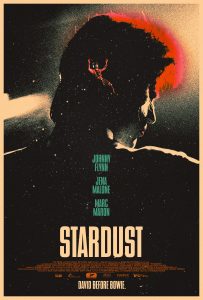
The prospects for a picture about a historical figure don’t bode well when the opening frame unapologetically proclaims that what follows is mostly fiction. So it is with “Stardust,” an alleged “origin story” about a young David Bowie seeking to launch his career in America on a 1971 promotional tour plagued by problems, many of which originate with the rising rock star himself. But, given the opening disclaimer, how much of it is true? And, because of that, without further credible attribution, why should any of us care? Add to that a host of underdeveloped story threads, precious little music (including absolutely no Bowie compositions due to a rights issue), and, perhaps most critically, a cogent explanation of exactly how Bowie developed his alter-ego Ziggy Stardust, and you’ve got a mess of a movie that’s all over the map. To be sure, the capable performances of Johnny Flynn, Marc Maron and Jena Malone help to make up for these shortcomings somewhat. However, given the iconic talent that David Bowie was, he and his fans certainly deserve a better treatment of his life and accomplishments than what’s presented in director Gabriel Range’s sorely disappointing effort.
1. “Palm Springs” (USA/Hong Kong)

Golden Globe Awards – nominee, best comedy picture, best comedy actor (Andy Samberg)
Critics Choice Awards – nominee, best comedy
Independent Spirit Awards – nominee, best first screenplay
Never have I been as anxious to await a movie’s ending as I was while watching this waste of good celluloid. This truly awful knock-off of “Groundhog Day,” mixed with elements of silly sex comedies, kitchen table metaphysics, lame self-help suggestions and stabs at the kind of obligatory insipid dramatic sequences typically found in cheesy rom-coms, lost my interest about 10 minutes in and never got it back during its torturously overlong 90-minute runtime. It’s truly astounding how this inane project ever got greenlighted and managed to attract performers like J.K. Simmons, June Squibb and Peter Gallagher (let alone capture multiple unearned awards season nominations), but I can honestly say that I never laughed once – not once – during first-time feature director Max Barbakow’s stupendously inept comedy. The cloying, over-the-top performances of Andy Samberg and Cristin Milioti are headache-inducing and unenduringly annoying, making me wonder what anyone could possibly see in this cinematic monstrosity. I implore you to avoid this mess at all costs.
Dishonorable Mentions
11. “Luz” (USA)

What begins as a cellmate friendship turns into a prison romance in which the partners must cope with their circumstances when paroled (and separated) at different times, a situation that becomes further complicated once both are in the outside world again. Unfortunately, despite this mildly intriguing premise, director Jon Garcia’s overlong offering gets bogged down in subplots that are never fully developed and/or descend into the depths of predictability. I couldn’t wait for this one to end and to see what neat, tidy wrap-up it would employ before the credits rolled (something my eyes were already doing throughout much of the film’s second half).
12. “Careless Crime” (“Jenayat-e bi deghat”) (Iran)
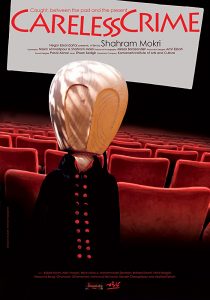
Handily one of the most audaciously pretentious pieces of cinematic crap I have seen in ages. “Based” on a tragic act of arson in an Iranian moviehouse shortly before the 1979 overthrow of the Shah – a premeditated terrorist attack on so-called decadent Western cultural influences – “Careless Crime” echoes that story and sentiment in a modern-day theater presenting a film by the same name. That movie-within-a-movie, in turn, echoes the lives of present-day theater owners and patrons attending a screening that has been targeted for attack by a quartet of contemporary arsonists, while also giving nods to the anniversary of the 1979 moviehouse incident, creating a multi-layered, folded-over time loop involving the integration of the three primary story threads. I found director Shahram Mokri’s overly glib, too-clever-for-its-own-good offering to be stunningly baffling, frequently pointless, and, frankly, lacking in respect for the original tragedy. I might have cut this film more slack if it weren’t directly referencing an actual event in which nearly 500 people lost their lives, but a project that so cavalierly springboards off of a tragedy like that just leaves a bad taste in my mouth, as I would think it should for most viewers (that is, those who’d be willing to waste 2:15 of their lives watching this celluloid mess). Add to that some rather cheesy production values and a desperate need for excessive editing, and you’ve got something that’s really not worth your while, despite its inexplicable capture of the Chicago Film Festival’s Silver Hugo Jury Prize Award.
13. “Incitement” (Israel)
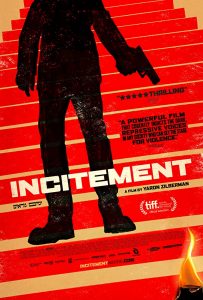
This occasionally-thrilling, though often-overwrought and somewhat overlong film detailing the 1995 assassination of Israeli Prime Minister Yitzhak Rabin, as told from the viewpoint of his killer, baffles as much as it illuminates. With the exception of a handful of scenes in which assassin Yigal Amir is discouraged by family and friends for his views and plans, his actions otherwise are more glorified than condemned, while the right-wing nature of his politics (and his reasoning for shooting Rabin) is shrilled all out of proportion, almost to the point of sheer annoyance. Filmmaker Yaron Zilberman’s treatment of the material is indeed odd, even if technically well orchestrated. But, despite this technical proficiency, one can’t help but wonder what exactly the director was going for here – or why there even needed to be a picture addressing this subject in this manner at this time. Quite a puzzle, to be sure.
14. “Memory House” (“Casa de antiguidades”) (Brazil/France)
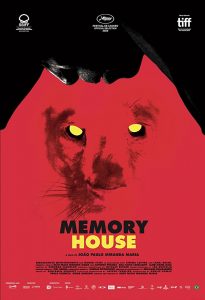
Ambitious, haunting and hypnotic but ultimately wildly unfocused, this debut feature from director João Paulo Miranda Maria tries to cover too much ground and ends up doing more to baffle viewers than to enlighten them. In this symbolic and surreal examination of the de facto state of colonialism existing in contemporary southern Brazil, the narrative attempts to explore the ethnic, sociopolitical and inequality issues affecting the region’s minority population as told through the eyes of a Black dairy worker. Ethereal imagery and inventive cinematography get the picture off to a promising start, but the film loses its way as it goes on, pursuing one unresolved tangent after another and eventually going completely off the rails in the final act. While it’s commendable that the filmmaker doesn’t spoon-feed his audience, he nevertheless seems to expect them to possess an intimate knowledge of Brazilian politics and culture to grasp his message. That may be fine for a screening to a regional viewership, but, for film festival or mainstream audiences outside Brazil, that’s expecting a lot from viewers just to be able to understand what he’s trying to say. In spite of these problems, however, the film somehow managed to capture the Roger Ebert Award in the Chicago Film Festival’s New Directors Competition.
15. “Sleep” (“Schlaf”) (Germany)

What starts out as an ambitious suspense tale turns tedious not far into the story as it introduces so many different unresolved tangents that it becomes difficult to decipher and even more of a chore to care about. With references to lucid dreaming, German folklore, and past and present right-wing German politics, director Michael Venus’s debut feature becomes so convoluted that it leans laughable when it’s not being a big bore (or “boar,” given its repetitive woodland animal imagery). What’s most regrettable, though, is that this supposed horror thriller fails to live up to its billing by coming up short on its primary mission – being scary, something it most definitely is not. Sadly, when watching a film becomes too much work to enjoy the experience, it’s really not worth the time or effort, and so it is with this big snooze.
16. “Sweat” (Sweden/Poland)

What makes us happy? And are those who are seemingly happy all the time truly the happiest? Those are the questions posed by “Sweat,” the story of a popular online fitness instructor who seems to have it all together, but does she really? In this age of omnipresent social media, that’s a critical question we all need to ask ourselves, and the film makes a valiant attempt at doing so, but it takes far too long to make its point, taking viewers through considerable seemingly irrelevant flotsam on its way there. While director Magnus von Horn’s second feature deservedly earned the Festival’s Silver Hugo Award for best art direction at the Chicago Film Festival, it’s rather hard to fathom that the film also captured the Gold Hugo Award as the Festival’s best feature (it’s simply not that good). Indeed, for a better cinematic exploration of the film’s central message, watch the vastly underrated American offering “Ingrid Goes West” (2017) instead.
17. “Emma” (UK)

Golden Globe Awards – nominee, best comedic actress (Anya Taylor-Joy)
Critics Choice Awards – nominee, best production design, best costume design, best hair and makeup
Unless you’re a diehard fan of the period piece comedy of manners genre, you’ll probably find director Autumn de Wilde’s version of Jane Austen’s classic novel about a self-absorbed genteel woman who fancies herself a matchmaker to be one of the most tedious and unengaging films you’ll ever watch. While the production is meticulously assembled in its costume design, art direction and cinematography, with a fine lead performance by Anya Taylor-Joy, the picture is otherwise emotionally flat and astoundingly boring, one that will challenge the patience of even the most tolerant moviegoers. The wit and humor that make this work succeed is virtually nonexistent here, with a bevy of well-dressed characters prattling on and on about relationships involving people most viewers are likely to care nothing about. Given the many versions of this story that have been made over the years, and in light of the substandard quality of this one, perhaps it’s time to give “Emma” a well-deserved rest for a while.
18. “The Assistant” (USA)
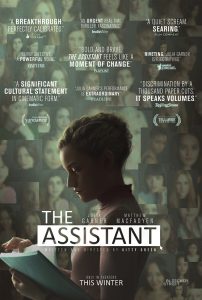
Independent Spirit Awards – nominee, best first screenplay, best cinematography, best actress (Julia Garner)
This tale of an entry-level movie company production assistant who’s witness to questionable behavior by her boss and considers blowing the whistle fizzles when it should sizzle. The message may be important, and Julia Garner’s lead performance may be reasonably compelling, but the film itself leaves much to be desired. Instead of offering new insight into a troubling industry problem (and any semblance of hope for the future), writer-director Kitty Green’s debut narrative feature stretches credibility by presenting an allegedly savvy protagonist who displays an astoundingly unbelievable degree of naïveté. What’s more, the supposedly “nuanced” evidence of the transgressions is so painfully obvious that any attempt at subtlety is obliterated. On top of all this, the film’s glacial pacing and inclusion of far too much extraneous padding make this an excruciatingly slow watch, even with its scant 1:27 runtime. This multiple Independent Spirit Award nominee has been vastly oversold in its restatement of the obvious with no adequate remedies for addressing its core issue. Watch “Bombshell” (2019) instead.
19. “Martin Eden” (Italy/France/Germany)

Loosely based on author Jack London’s 1909 novel of the same name, this Italian adaptation struggles to find its footing with an overly intellectualized narrative that attempts to fuse sociopolitical discussion with the merits of self-education and personal growth and development. Set in an indeterminate time in Italy’s history (though the 1970s would be a good guess), the film follows the odyssey of an angry young working class man with minimal schooling who seeks to improve himself and rise above his social status by ravenously reading and pursuing a writing career after meeting a bourgeois love interest. It’s a process that gradually turns him into an angrier young man when his vocational pursuits don’t pan out, leading to personal dissatisfaction, unwitting political turmoil and the dissolution of his forbidden romance – all of which ironically lead to his surprise recognition as a gifted scribe, unexpected success and a new round of individual disillusionment. While filmmaker Pietro Marcello’s second narrative feature outing is modestly interesting in the first half, it gradually starts to fall apart thereafter before completely losing it in the incoherent, overly dramatic final act. Don’t let the lavish praise heaped on this offering fool you. This one is vastly overrated, to be sure.
20. “To the Ends of the Earth” (“Tabi no owari sekai no hajimari”) (Japan/Uzbekistan/Qatar)

Take one part character study, one part campy comedy (although that may have been unintentional) and a whole vat full of schmaltz and you’ve got one searing mess of a movie. This Japanese offering about a clueless TV reporter for a cheesy travel show doing segments about life in Uzbekistan has more changes of mood and plot than Baskin-Robbins has flavors. Between her uncanny knack for perpetually failing at her work and finding herself in the wrong parts of town, a compelling but largely inexplicable urge to free a penned-up goat, her seemingly underwhelming romantic feelings for her boyfriend back home (except when it really counts), and an underdeveloped (and somewhat indifferent) attitude toward wanting to fulfill her ambition of becoming a singer, you’ve got dear, sweet, shrill, naïve protagonist who has no meaningful or apparent direction in her life (even though she always seems to feel the need to fearfully run wherever it is she’s trying to go at the moment). It’s pure, unadulterated ambling from start to finish. If anyone can tell me what director Kiyoshi Kurosawa was going for here, please explain it to me.
Forgettable (in no particular order)
“Coming Home Again” (USA/South Korea). Web site. Trailer.
“Citizens of the World”(“Lontano lontano”) (Italy). Web site. Trailer.
“Dreaming Grand Avenue” (USA). Web site. Trailer.
“Tommaso” (Italy/USA/UK/Greece). Web site. Trailer.
“Vitalina Varela” (Portugal). Web site. Trailer.
“Dreamland” (USA). Web site. Trailer.
“Three Summers” (“Três Verões”) (Brazil/France). Web site. Trailer.
“Little Joe” (Austria/Germany/UK/France). Web site. Trailer.
“The Tobacconist” (“Der Trafikant”) (Austria/Germany). Web site. Trailer.
“Tenet” (UK/USA). Web site. Trailer.
“Days of the Whale” (Colombia). Web site. Trailer.
“Never Rarely Sometimes Always” (USA/UK). Web site. Trailer.
Copyright © 2020-2021, by Brent Marchant. All rights reserved.